
The Project Gutenberg EBook of On Mule Back Thru Central America with the Gospel, by Mattie Crawford This eBook is for the use of anyone anywhere in the United States and most other parts of the world at no cost and with almost no restrictions whatsoever. You may copy it, give it away or re-use it under the terms of the Project Gutenberg License included with this eBook or online at www.gutenberg.org. If you are not located in the United States, you'll have to check the laws of the country where you are located before using this ebook. Title: On Mule Back Thru Central America with the Gospel Author: Mattie Crawford Contributor: Seeley D. Kinne Release Date: July 1, 2018 [EBook #57432] Language: English Character set encoding: UTF-8 *** START OF THIS PROJECT GUTENBERG EBOOK ON MULE BACK THRU CENTRAL AMERICA *** Produced by Bryan Ness and the Online Distributed Proofreading Team at http://www.pgdp.net (This file was produced from images generously made available by The Internet Archive/American Libraries.)
Transcriber’s Note: Illustrations have been moved so as not to fall in the middle of paragraphs (leaving them as close to the original position in the book as possible). A few minor printing errors were corrected.
WITH THE
GOSPEL
A Thrilling Missionary Story
Giving personal experiences on the mission field; of an
unshaken confidence in the God who took the
family to the field; supported them while
there; gave them many precious souls
for their hire, and brought
them back victorious.
SECOND EDITION
Copies of this book may be obtained from
MATTIE CRAWFORD
Missionary and Evangelist
3573 Shurtleff Court, Los Angeles, California
Copyright, 1922, by
MATTIE CRAWFORD
(Published in the United States of America)
All Rights Reserved
| Preface | 7 |
| A Message Given to Me in Tongues with Interpretation | 15 |
| Preparing to Start | 17 |
| Home Leaving | 18 |
| The Church in Unity. (The Wonderful Vision) | 32 |
| Opening the Way | 36 |
| Bread Upon the Waters. (From Los Angeles to Nicaragua, C. A.) | 48 |
| The Stars and Stripes and Beautiful Manzanilla | 59 |
| Salina Cruz, Mexico. (My Vision Interpreted) | 64 |
| The Virgin of the Angels | 71 |
| Arriving in Our Port at Nicaragua | 82 |
| Our Stay in Matagalpa | 97 |
| Leaving Matagalpa for Leon | 110 |
| Our Arrival in Leon | 138 |
| Leaving Nicaragua for Panama | 183 |
| Sailing from Panama | 190 |
| The Needs of Central America | 200 |
| The Indians of Nicaragua. (Extract from Article by Brother Schoenich) | 212 |
| “Where is the white man’s Book of Heaven?” | 216 |
| Frontispiece. Mattie Crawford | 9 |
| The Crawford Family | 13 |
| Father N. J. Norris, who paid our way to the Mission Field | 45 |
| S. S. Curacao on which we sailed to the Mission Field | 49 |
| On Board Ship | 53 |
| Carl on bridge of ship at sea | 57 |
| Some natives of a tribe in Guatemala, C. A. | 61 |
| “Come over and help us” | 65 |
| Taking their morning bath | 69 |
| A native village | 75 |
| Picturesque street scene of the Port of Corinto, where we landed | 83 |
| Resting during the heat of the day | 85 |
| Where they heard the Gospel for the first time | 89 |
| An Indian hut where we preached the Gospel | 93 |
| Indian girls grinding corn for tortillas | 95 |
| Alma and her music class in Matagalpa | 99 |
| Washday at the river for native women. Their only way to clean clothes is to rub them on a flat rock | 101 |
| Where we stopped for the night. Note the glare of the sun on the white sand | 105 |
| Alma and Carl among the banana trees | 107 |
| Leaving Matagalpa | 111 |
| Leaving in the early morning for a day’s journey | 113 |
| Alma and Carl feeding the pet deer | 117 |
| On our way through the mountains | 119 |
| [6]Carl with his faithful pony | 123 |
| Bringing coffee down from the mountain plantations | 125 |
| The only Jesus they know | 129 |
| One of the first to accept the Gospel | 131 |
| Carl and his father, as they distributed tracts to the Indians by the roadside | 135 |
| Street scene in Leon | 139 |
| Mother with child that was raised up from death | 143 |
| Waiting for the Gospel | 147 |
| Carl with his boys | 151 |
| Where I preached until midnight; and the entire family was brought to the Lord | 159 |
| Where the entire family was brought to Jesus, and the mother’s hand was healed of blood poisoning | 163 |
| Where Carl attended native school to study Spanish | 167 |
| Women coming from the market place | 171 |
| Alma with her music class in Leon | 175 |
| Alma with her English class of native girls | 181 |
| Alma reading a Bible story to her girls | 187 |
| An Indian woman who came to the meeting and was saved | 191 |
| I am just a brown-faced Indian girl, but I want to learn to read God’s Word. Will you send missionaries to teach us? There are thousands just as I am | 203 |
| One Indian who found Jesus and loves his Bible | 209 |
| An Indian woman whose attention was attracted and picture taken without her knowledge. Indians are very superstitious and are afraid to have their pictures taken | 217 |
The days of miraculous achievements are not past, as the accounts chronicled in this book will testify. Four people make a missionary trip from Los Angeles, Cal., down the coast of Mexico, preaching in many of her towns while the ship discharges or loads cargo. They arrive in Nicaragua and preach to the natives, seeing numbers of them baptized in the Holy Spirit. Returning to the States by way of the Panama Canal, and New Orleans, they reach St. Louis and Granite City, having been gone less than two years.
Without missionary board, or other promised support whatever, the Lord provided some $3,000.00 for the trip. It is a testimony to His faithfulness, a sample of what He can and will do for those who will put their trust in Him. Some might question the wisdom and value of the shortness of their stay, but they moved under Divine direction. If any possible critic had accompanied them in their journeyings, and seen the fire in the hearts of those native people there would have been no doubt in their minds as to the exceeding profitableness of the journey in the advancement of the kingdom of God. Many remote and scattered people were reached. Praise God! They will be seen in Heaven because of the Gospel message which they heard.
Then, too, this sketch of many happenings will, we trust, kindle a flame of missionary fire in many hearts, and give them a sense of the great need of these Central American republics, so that they, too, will have to go, pray, or give. Brother, Sister, have you not some responsibility toward sending the Gospel to those benighted people so long neglected? Let us not share in the great age-long crime of the church in her neglect of the heathen. Do not pass the time in mere happy dreams of spiritual blessings while the procession of your lost brethren of other nations tramps on into eternity with no Christ. Be not like drones, who eat the honey but do nothing for the advancement of the kingdom.
Seeley D. Kinne.

Affectionately dedicated to my precious Master, the Lord, who made possible this service, and to my dear husband, son, and daughter, who were noble sharers in the battles and triumphs described.

It was on this message from the Lord that we went to the mission field by faith, without any earthly board behind us, knowing that what God had promised He would perform.
“The time has come when I will send thee forth. Arise! put away all doubt and say to the dark clouds, ‘Depart from before my face!’ and to all fear that may arise to stop you from following in the way that I shall lead thee, ‘Flee ye, far from me, to return no more! for the Lord my God hath spoken, and I shall not be dismayed nor put to shame!’
“Begin this day to prepare to go forth, for I will send thee unto the land to which I have called thee, and every need shall be supplied.
“Only be strong and of good courage, for My left hand is under thy head, and My right hand doth embrace thee. Thou shalt sit down under My shadow with great delight, and My fruit shall be sweet to thy taste. I will plant thee in a fruitful land, and thou shalt bring forth fruit in My name, some thirty, some sixty, and some an hundred fold. Do not fear to go forth in My name, for I am thy shield and thy exceeding great reward. I Am that I Am hath spoken unto thee this day, and I AM THAT I AM will go before thee.
“Thou shalt see of the travail of thy soul, and shall be satisfied, for thou shalt see many that sit in darkness and the shadow of death see the light of My glory, and come to praise My name. For from the rising of the sun[16] even unto the going down of the same, My name shall be great among all nations.”
After receiving the wonderful message in tongues, with its interpretation, telling us the time had come for us to make ready to go to the mission field, we began packing our trunks, putting away the things which we would not need during the summer. We had been working in a hard field that winter, the income had been very small, and poor husband had worked as much as possible, to get the children clothes and books for school. But work was scarce and the battle had been long and hard, for we felt we must settle down again that the children might be in school, which matter the Lord had dealt with us about many times before.
We were preparing to start as soon as the way was opened, when there came a letter from a brother asking if we would not come and have some meetings with them. We felt led to go, and on arriving found the revival spirit was in the air. The first night the place was packed, and the altar was filled with hungry people seeking the Lord. We were there three weeks, and they certainly were blessed weeks of victory, for many precious souls received the Baptism of the Holy Spirit and many were healed, and the Lord sent in money for some clothing, which we were all needing badly.
After the meeting we returned for our trunks and to prepare for the trip across the country to California, for from there we were to sail for our field in Central America.
Bidding our loved ones good-bye we left Granite City, Illinois, May 29th, 1919. We took train from St. Louis at 4 P. M., for Stanton, Missouri, where God had definitely led us to go.
As the train sped out of the city and over the long stretch of country beyond, I was meditating over the many things that had happened at our farewell. My dear mother had said she did not understand this thing, and my brothers and sisters had spoken against our going out in such a foolish way, without money and without backing of any kind. They just knew that we would all starve and die in that far-off country. None of them being Christians, they could not understand how the dear Lord could supply our every need. But the blessed Holy Spirit had spoken to my heart and said, “You have left all, brothers, sisters, father, mother, houses and lands for My sake, and the Gospel’s, so I will give you brothers, sisters, fathers and mothers, houses and lands, wherever you go.”
As we rode on, we were praying that God would lead us every step of the way, and not let us miss His will in any thing we did or said. As I took some tracts from my hand bag to distribute among the passengers I noticed a white-haired gentleman take a seat just across from us. The Spirit said to me, “That is one of your Pentecostal brothers. Ask him what you want to know about the place to which you are going.”
We were not acquainted with any one at Stanton, and had been wishing that we could find out something about the place and the people before we arrived. I began distributing the tracts through the car, and when I came to this man he looked up and said, “Praise the Lord!” We had a blessed time from there on, talking of the work over the country, and learning of conditions at Stanton.
Arriving at the station we bade our brother good-bye and got off the train. It was now quite dark, and raining, and our funds were down to twenty cents. We stopped under the shed of the depot long enough to pray for leadings from the Lord, for it was late, the agent had gone, the depot was closed and the brother had told us that he thought most of the saints lived out in the country. As we looked to our Heavenly Father to guide us He directed us to a store on the hill. The owner was just closing the door as we came up. My husband asked him if any of the mission people lived in the town and he said he did not know. As we passed down the street we heard some one say, “Well, ‘Praise the Lord!’ Where did you come from?” It was dear brother Armstead. We had met him and his wife in some meetings in St. Louis, but did not know they lived in Stanton. Also others were there whom we knew, having met them in other places. We stayed about ten days and had blessed meetings. The blessing of the Lord came down upon our souls, the dear[20] little band of faithful saints were refreshed, and the altar was filled with those seeking the Lord.
A remarkable incident occurred here. A woman across the street from where we were having the meetings became very much incensed at us because she thought we prayed and sang too loud. She sent her children over to throw rocks and sticks at us, while she sat in her house and made light of the shouting. One night the power fell in a wonderful way and the people were very happy. This woman was sitting barefoot in her bedroom reading the evening paper, and felt something cold touch her foot, but did not give it any attention at first. Feeling it again she looked down, and there was a very large snake coiled ready to strike her foot. She sprang away and screamed, then ran to the meeting crying for some one to come and kill the snake, as it had gotten on the bed where the baby was asleep. Some of the brothers went over, found the serpent on the bed, and killed it. After that the woman felt different toward us and our shouting and praising the Lord. We had been praying for her and the Lord had told us He would take care of it all. We find the Lord uses different means to bring people to Himself.
From Stanton we went to Rolla, Missouri. We knew no one in Rolla, or anything about the place, but the Lord had told us to go there, so we went. We just had money enough to get there. As we stepped off the train a brother threw his arms around my husband and said,[21] “Well, Hallelujah! My wife told me to come and meet this train, for the Lord was sending some one on it to help us in the meetings we have just started, and here you are, just in time.” They had opened a little work there and had been asking the Lord to send someone to help them, so He had sent us, bless His dear Name! He also sent the Holy Spirit, for we had a wonderful time. One of the hard fighters of Pentecost received the Baptism, and many others were blessed in their souls, and some were healed in their bodies.
From Rolla we went to Springfield, Missouri, and stayed over Sunday with the dear saints there, having a refreshing time for our souls, and a rest for our bodies. From there we went to Everton, Missouri, where we had been led to hold some meetings.
On arriving in this little town we found that the only building there was for the meetings had burned down the day before. We spent the day in a grocery store praying for a door to be opened for the Gospel, for we had been told it was a very wicked town and that the Pentecostal message had never been preached there.
In the evening we went out to see about getting some rooms where we could stay while there. Going to a certain place we met the Presbyterian minister. When he found that we had come to have revival meetings he hastened to open his church to us and insisted that we begin the services that night. He told us[22] that he had been praying for a revival as they had not had a convert in that town for over thirty years, and that he hoped we could do something to stir the people up. He had not asked us what we were preaching, as many others do when we arrive in a new place. If he had known how we would stir up things in that dead town and that fine Presbyterian church I don’t know whether he would have been so quick to invite us in.
He rang the church bell, we went in and began to sing and pray, and soon the crowd came. Such a hungry-looking lot of people they were, yet they looked like they were ready to run if something happened that they did not understand. As we prayed and testified the glory settled down over us. Each night the people moved up a little closer to the fire, and some dared to come up in the rostrum and help us sing. Once in a while we heard a faint Amen from the dear old pastor, and one night, after the Lord had met us in a very sweet and wonderful way, he came and said, “There is something so different about you people from what we have ever seen in others. Why,” said he, “it is no trouble at all for you to pray and testify, and there is something about these meetings that fills my heart with joy, and I want you to pray that I will get this blessing that you have, for we need a great spiritual awakening here.”
I felt like jumping up and down and telling him we had the Baptism of the Holy Ghost and it was that which made us different from other[23] folks. O Hallelujah! But I knew we must use wisdom with them, so left it to the Lord to work out in His own way and time.
The next night the power fell on Sister Hagg, and she went up and down the platform singing in the Spirit and speaking in tongues. We were wonderfully anointed and had a blessed meeting. The dear people had never seen anything like that before. They looked so hungry.
The next morning the pastor and his wife came to our rooms and he said, “I want this blessed experience. Pray for me, and pray for my wife’s healing.” She was deaf. We had a sweet time praying together, the dear old pastor calling on God to send the Holy Spirit into his life and into the church.
The next day we had to move on to Kansas City. But I am sure there was a work done and seed sown in Everton that will bring forth fruit. The people came to bid us good-bye, saying they were so glad we had come and brought them the light of Pentecost.
At the depot we were told the price of our tickets was $20. We found we were short of that amount by $4.20. We had only $14.80. We went aside and prayed, telling the Lord He had told us to go to Kansas City, Missouri, and now the train was arriving and we did not have sufficient money. The Lord said, “Go to the window and call for the tickets.” We obeyed, knowing the Lord was able to send money right straight from Heaven. As husband received the tickets through the window, the agent said,[24] “$14.80.” We were soon on the train speeding on our way. We do not know just how it came about, but we know God did it. Hallelujah! He makes a way where there is no way, if we believe.
It was after dark when we arrived in Kansas City. We prayed and asked the Lord just where He wanted us to go as we did not know anyone there. He directed us straight up a street. We walked several blocks, not knowing where there were any missions. We saw a nice little brick church on a corner, but no sign to tell about meetings, and the doors were closed. As we stood there praying, the Lord told me to open the door and go in.
As we pushed on the door it opened into a vestibule. From there some steps led into the auditorium through another door. We heard some one saying, “Praise the Lord!” and knew they must be Pentecostal people. A brother came with outstretched hands to greet us, asking, “Where did you come from?” It was dear Brother Huff from Chicago, who was in charge of the mission. We had a blessed time together praising God and seeing souls brought in and baptized in the Spirit. We were also blessed with Brother Scott in the mission in Kansas City, Kansas, and with his saints.
We then went on to Topeka, Kansas, by the direction of the Lord. We never went anywhere until we had prayed and received instructions from the Lord. Most of the time He spoke through my lips the name of the next place,[25] even telling us when to go, and what train to take. Oh, the blessedness of the sweet Holy Spirit flowing in and upon our souls till we are lost in Him.
“He leadeth me, oh, blessed thought.”
We arrived in Topeka, knowing nothing of the missions there or how to find them. As we were walking down a street the Lord said, “Ask that boy where the mission is.” He was the son of one of the saints, and lived near the mission. We were at that mission two weeks and had a precious time.
The Lord provided for us to travel to Colorado Springs with Sister Bowers in her car. Many were the times and ways God showed His mighty arm out-stretched toward us. We started with very little money to buy food and gasoline, or to pay for repairs for the car. But He provided for all.
One morning as we were crossing a bridge, some drunken men ran their car into ours, throwing it over the edge of the bridge which had no rail, the bridge being a new one and not completed. Our machine hung out over the water fifty feet below. But as we went over the edge the power came upon us all, and we began speaking in tongues. The glory of God came down like a great white cloud, and the machine was picked up and set in the middle of the bridge without a scratch on us or on it.
Another time when we came into a town we were told that the road ahead was impassable;[26] that twenty cars had been pulled out of the place where the water covered the road for about a mile. We asked the Lord if we should go on or not. He said we should go on, and if we believed we should see the glory of God. As we approached the water, which came up to the doors of the machine, and with great ditches on either side, filled with water, we could not see where the road was, nor where the ditches were. The power came down over the machine, and we all began to sing in tongues. Sister Bowers’ hands went up in the air, and never touched the wheel till we were over the place, about a mile in length. The mud and water did not even splash the wind shield or machine anywhere.
“We will rejoice in Thy salvation, and in the name of God we will set up our banners. The Lord fulfil all thy petitions.”—Psalm 20:5.
We stopped at several places on the way and held meetings. We also gave out tracts and papers, filling the rural mail boxes along the highways with gospel literature. Each morning we cooked our breakfast and had our morning worship by the roadside, then went on our way praising God for all His goodness in permitting us to preach His glorious gospel.
One night when we were sleeping out on the open prairie—as we were too heavily loaded to carry a tent—there came up a terrible storm. The wind blew at a terrific gale and the thunder[27] and lightning were awful. We were fast asleep when a large coyote came near and began his loud barking, evidently sent by the Lord to awaken us just in time to see our clothes and hats sweeping across the plain before the fierce wind. We ran after them, and prayed the Lord to stop the storm, telling Him He had promised us that it should not rain on us. Then the wind stopped, also the thunder and lightning, and we had nice dry weather the rest of the way.
Arriving in Colorado Springs, we were welcomed by the dear pastor and people. They had a nice assembly, and the Lord sweetly worked the few days we were there.
Some people from the plains came asking us to come and hold meetings for them in a school-house. They had never heard Pentecost preached, excepting one woman who had read some about it and was hungry for the Baptism. We found the whole country Free Methodist, and they said they had the Holy Spirit.
We had meetings every night for about a week, everybody sitting back and looking on. On Sunday we were invited to the home of some of the leading people for dinner. After we had eaten, someone went to the piano and began playing a hymn, and we started to sing. Soon we heard a terrible noise. Looking around we saw the man of the house laid out in the middle of the floor, shaking from head to foot under the power of God. In fact his feet were up in the air and his whole body was shaking violently. His wife and the people were running out after water[28] to throw on him. But we told them it was the power of God, and they must leave him alone. They declared he had a spell with his heart and was dying, but we kept on singing and holding on in prayer till he came through.
The news spread all over the country, and that night all the rigs and autos for many miles around were there bringing the people to see the strange sights. While we were singing, the daughter of this same man arose, came to the altar and fell under the power. The fire spread over the house, God working in a wondrous way. Some said it was the power of God, others said we were hypnotizing the people, and that was what made them fall. The whole country was stirred, and many heard the last-day message of the outpouring of the Holy Spirit to prepare the people for the coming of the Lord. We still receive letters from these people. They are holding on to God, and He is blessing them.
We also visited with dear Brother and Sister Roper and their sister Stout, at Immanuel Faith Home, in Pueblo. This is a school for orphan children, and a faith home where saints and missionaries can come and rest for a while. We were there for a week, and those were days of great blessing and refreshings from the Lord. These clear saints have opened that wonderful work in faith, looking to God to supply every need, and surely He has done according to His promise. The way we saw God work there in answering prayer was far beyond anything we had ever witnessed before, and the way the dear[29] little children were taught to pray and trust God for their needs was blessed.
From there we went in the machine to Denver, where we spent two weeks at the camp-meeting. How the blessing of the Lord did come down on our souls! We were greatly refreshed and our faith was quickened. The latter was needed, for we were going to the mission field by faith, looking to the Lord alone to supply every need.
The camp-meeting was coming to a close and the tents were being taken down, but we did not know where we were to go next. As I was packing the suit-cases, and getting ready to leave, the Lord said to me, “Arrange your clothes, for you will go to Los Angeles in a few days.”
Offerings had been small and expenses heavy, so we had but little money, therefore we did not see how we could get to Los Angeles. But never mind. “The natural man receiveth not the things of God.” Don’t reason, but believe. As I walked out by the lake, and saw the pretty little fish so at home in the beautiful water, without a care, for God took care of them, He spoke to my heart, and said, “Not a worry, for as I made this beautiful crystal lake for the fish, so I have made a great and beautiful way for My children. And just as the fish swim through the water and drink it, so My little children shall live and move in Me.” “For in Him we live and move and have our being.”
Just then three women came up in a machine and stopped near where I was. All were[30] strangers to me, but the Spirit said, “Join yourself to them.” I went over and spoke to them, asking if they were Christians. They said they were, and were wanting to see me. They had heard me speak the night before, and wanted to see more of me. When I bade them good-bye one of them went with me to my tent. She said she had some of the Lord’s money for me, but did not know how to find me, as the camp was breaking up and everyone was going away, but she had been directed back to the camp-ground. “Give me your address on the mission field,” she said, “as I am to help support you there.” Besides what she gave me at the camp-meeting, she was one of our main supports on the field, sending her offerings in no small sums.
We then went to Colorado Springs with a brother in his auto. All the way the Lord kept saying to me, “You will leave for Los Angeles soon after arriving at the Springs.” As we must have $100.00 more for our tickets, we did not know how it was going to work out. When we went to the post office we received a letter from a brother in Kansas with a check for $100.00. In the letter he said, “I supposed you were in California, but as I was writing this check I was led to send it to Colorado Springs. Hope you receive it o. k.” So here was the rest of our fare. Just as God had said, we were to go to California. He had the money right on hand, bless His name! After buying our tickets and a little lunch, we had $3 left. We praised the Lord we were on our way to the mission[31] field, to tell the heathen of this wonderful salvation.
As the train pulled out of the station, a little sister who had been very kind to us threw $4 in at the window.
We passed through Royal Gorge, and over the mountains, reaching the highest point just as the sun was sinking behind the western hills.
They call it “The Top of the World.” There is a post office there where tourists mail folders and cards to all parts of the country, describing the beautiful scenery. Here is the Arkansas River, dividing at an elevation of 10,000 feet, running two ways, growing wider and wider as it flows down the mountain beside the railroad. I sat looking out the window at the stream which waters the fields all along the sides of the mountains and in the valleys. The water is conducted through great flumes running in all directions, even carrying the water up hill in some places.
The scene faded before my eyes, and in its place I saw a great desert, O, so big and barren! There was nothing but bits of thorny cactus growing here and there. The sand was dry and parched. Far out in the middle of the desert there was an old house. It was only a shack. The roof boards were so old and weather beaten they were curling up at the ends. The sides were beginning to fall away from the roof. The door was small and falling off the hinges. There seemed not one ray of hope for the little old shack so far away in the desert. The winds of many centuries had beaten upon its sides. It was ready to fall.
As I looked far away on every side I saw nothing but hot dry sand. Over the sand came a man. He was weary, and the hot sun beat fiercely upon his bare head. As he came nearer I saw he was reading a Bible. He was so interested in it that he looked not to the right or left. His face was right down in the Book. Behind him came another, and still another, until there was a great company of people, thousands of them, both men and women. All had their faces buried in the Bible. They were entering the little old shack, passing in one by one. I wondered at so many people being able to get into so small a house. But soon I discovered that the house was enlarging. The door became new and swung upright on new hinges.
As far as I could see across the plain people were coming. Each one’s face was down in the Word of God. They were all moving toward and into the house, now no longer a dilapidated shack but becoming a great strong building. The roof was now of new material, of such a bright red color that my eyes could not look upon it. The sides had become new. From the door clear water was beginning to flow. I could see the sands of the desert carried before it as it went down and out of the building. Then the water burst forth from all sides of the house, till all but the roof was clear, crystal water.
The water spread over the desert, until it had become a mighty river covering the whole country, and people of every nation came running to it. The great house in the center was[34] of such beauty that my eyes could not look upon it. The people began to come out of the house, but they were not the same as when they went into it. They were now large men and women, as tall as telephone poles. Their countenances were shining with the glory of God. In their hands were large nets. These they cast into the stream, in which there were many fish, for as the people of all nations ran and fell into the water they became fish. I could see their tails as they swam about. Each net was brought up full of fine, large fish.
Over the top of the building was written in letters of fire, “THE CHURCH IN UNITY.” As the vision disappeared, I realized I was still on the train. Having my Bible in my hand I opened to this Scripture, “DECLARE HIS GLORY AMONG THE HEATHEN, HIS MARVELLOUS WORKS AMONG ALL NATIONS.” I Chron. 16:24.
Then the Lord showed me that when His people receive, through the Holy Spirit, the revelation of the Word, they will come together in unity; not merely be brought together by some creed or doctrine, but by the revelation of the scriptures, as they are made Spirit and life. This will cause the dilapidated building, which represents the church out in the desert of unbelief and false doctrine, to become new, strong and great, with the waters of the Spirit flowing out to all nations. And just as the Arkansas River, rising at the mountain summit, divided and ran both ways, watering the fields on either[35] side of the mountain, so as the church reaches the mountain summit of God’s love and revelation of the scriptures, the waters of salvation will flow both ways, to the home and also to the foreign field, and there will be a Heaven-taught and Spirit-trained ministry of apostles, prophets, evangelists, pastors and teachers, for the perfecting of the saints, and for the evangelization of the heathen.
Arriving in Salt Lake City at noon the next day, we were told the train we should take for Los Angeles did not carry chair cars, so we would have to wait for a train that left at midnight. We were very tired from our long train ride and went aside in the station to rest. I lay down on a couch in the ladies’ rest room, but just as I had settled down for rest the Lord said to me, “Go and buy your berth on this train, for it will be the last train through.” I did not know what it meant, but I did not doubt the voice of God that had spoken to me so many times in the fifteen years I have been saved.
I went to my husband and told him, and together we went to the Pullman ticket office. The agent said, “I have not a berth left. The train is full and leaves in fifteen minutes.” I told him the Lord had said we were to go on that train, and there must be a place somewhere for us. He said he knew he had not a berth left. I said we must have two upper berths, as we did not have sufficient money for lower berths. The $4 given by the little sister in Colorado Springs as our train was leaving and the $3.00 we had was all we had for the berths. Just then a man stepped up and said there were two upper berths left, as some people had decided not to go on that train. “Well,” said the agent, “I guess they are for you, but you will have to[37] hurry, as the train is ready to go.” Entering the coach we found the two berths were together. How the Lord does plan for His children, opening doors which no man can shut. Hallelujah!
As we neared the California border the strike came on that paralyzed all street-car and train service for ten days. Three times the men were about to leave our train out on the desert. But we prayed, and God took the train through to Los Angeles. Other trains that started were forsaken by the trainmen and hundreds of people were left in the desert without food or water. Relief was sent to them by auto trucks, and they came through in that way. But God spoke to us, and we obeyed, and went on the last train that got through for over ten days.
How God does care for His own! We were going out as missionaries and He wanted to teach us lessons of faith. That is why He took us along with just enough money for one trip at a time. Many times we were without money or had but little. Then, He would tell us not to look at our little means, but to look to Him, with Heaven’s great storehouse full for all who would believe. “The just shall live by faith.” The new creature in Christ Jesus becomes heir to ALL His riches in glory. “O the depth of the riches both of the wisdom and knowledge of God! how unsearchable are His judgments, and His ways past finding out!” Rom. 11:33.
We arrived in Los Angeles with seventy-five cents. The taxi man asked $4 to take us to[38] the camp-grounds, and no street cars were running. We asked Father how we were to get out there. It was too far to walk. I was directed to a little lunch-counter across the street, to ask the man about a machine standing in front of his place. He told me he would take us out there, as he was carrying passengers since the strike was on. We asked him the fare and he said, “Seventy-five cents.” We laughed, for Father knew just how much we had, and would not let him ask more.
We reached the camp-grounds about nine o’clock. The Evangelist was preaching on faith, and how we should trust God. She stretched out her arm toward us and said, in a loud voice, “The just shall live by faith.” This was a familiar text to us, as it had been our motto for some three months, or more, but it is always new.
Brother Fisher came and said, “We have a tent up and ready for you, but we have made no arrangements for meals for you, as everybody makes their own arrangements for those.” We praised God for the tent and knew He would take care of the rest, for He had sent us there, so He would provide.
We were invited home with some friends that night, but returned to the camp to stay the next morning. Noon came. Everybody was going out to the stand to get lunch. We had to pray. So we went into our little tent, knelt down and told our Heavenly Father about our needs. He[39] says He knows our needs before we ask Him, but we receive by asking. It is so sweet to tell Him about every little need. We had spoken to no one else about them, as that would not be faith. We went across the grounds to the big tent. A sister came, put her arms around me, and said, “Sister, are you a missionary?” I told her we were just going out for the first time. She said the Lord had laid it on her heart to open a dining tent for the missionaries on the camp-ground, and she wanted to invite me and my little family to eat with them. I need not say that dining tent was one of the sweetest places I have ever seen. We would gather there and sing and praise God and eat the food He had provided. It was Heaven on earth. I am sure dear Sister Craton and her sister, who worked so faithfully, will receive abundant reward when Jesus comes.
The meeting was wonderful. The Word was preached under the mighty anointing every afternoon and night. Hundreds were brought in and baptized in the Holy Spirit, and many were healed. One day they carried in a Jew. He was an invalid, had been sick for many years and did not believe the Bible or in God. We gathered around him and prayed. A great ball of fire came down through the tent, struck that man on the head, knocked him out of his chair and on to his feet, and almost knocked down all who were praying with him. He was healed and baptized in the Holy Spirit, and ran over the grounds leaping and praising God.[40] Many things God did there that strengthened our faith and prepared us for the life of faith on the mission field.
After the camp-meeting we rented a little apartment where we might live and make ready for our trip, for there was sewing to be done and things to be made ready. We were expecting to sail about the first of October. But one day, as we were praying about when we should sail, the Lord said, “You will sail about the first of the year.” We thought that was a long time off, and did not understand why we were to wait so long. Going to the steamship office we learned that the port of Corinto, where we were to land, was under quarantine for yellow fever, and had been for several months, but the ban would be lifted about the first of the year, and it was.
They were precious months that followed. Everything that we needed had to be prayed in—trunks, suitcases, clothing, everything came in answer to prayer.
While in San Francisco I was very busy in meetings and had many letters to write. Sister Kerr said, “Ask the Lord to give you a typewriter to take with you.” “Oh,” I said, “I could never have faith for a typewriter, as I could get along without that, and need so many other things.” While I was praying in my room the Lord said to me, “You can have faith for a typewriter. Ask for one, and you shall have it.” I said, “Lord, I do not know how to use a typewriter.” He told me that when I went back to Los Angeles I could go to night school and[41] learn to use a typewriter, and then He would give me one. This I did, and soon learned how to typewrite. Then I received a letter from a brother enclosing a check for $50, saying it was for a Corona typewriter to take to the mission field. I had never seen the brother and do not know how he knew of me, but God knows. I almost ran to the Corona office to get my typewriter, and with it I am writing this book.
“I love the Lord, because He hath heard my voice and my supplications. Because He hath inclined His ear unto me, therefore will I call upon Him as long as I live.”—Psalm 116:1, 2.
While in Oakland dear sister Rawlins told me the Lord had spoken to her to take her new Singer sewing machine, go home with me to Los Angeles and do up all my sewing. Here again was the dear loving hand of my Heavenly Father. He said He would give me mothers and brothers and sisters. This dear sister was truly a mother to me. She came with me, did up the sewing, and, as we were packing ready to leave for the mission field, and she to return to Oakland, she gave me the machine to take with me. How sweet that God has so many precious children who are ready to lay down their lives for the Gospel. We may not all be called to go, but we all can do our part. God bless every one who has given so freely and made it possible for the missionaries to go. As I think of the many things and the money that have been given by the dear children of God, it makes me[42] fear I may not prove true and use it all to His glory. But there is a cry in my soul that the Lord will help me to be faithful, and render unto the Lord for all His benefits unto me. Psalm 116:12.
Everything was provided for the trip. New trunks were sent up to the house. Two nice handbags were given. One woman gave my daughter and me beautiful riding suits made to order. A certain book I had long been wanting to read, and had not been able to get, was brought and laid on our table when I was out. Many little tokens of love were brought by the saints—nice useful things.
But there was one thing lacking, a most important one. That was our fare. The Lord had miraculously interfered and gotten us our passports, and everything was packed and ready, but no money for the fare, which was near $700.00, including excess baggage. One morning, while praying in my room, the Lord said, “Go to the steamship office and make your reservations.” “But, Lord, I haven’t the money to pay down.” He said, “Get ready; I will send the money.” By the time I was dressed and ready, a friend entered the room and gave me $15. Well, why hadn’t the Lord sent all that was needed for the fare? Never mind; He had another lesson of faith to teach us. I went to the office and found out about the steamers. One sailed January 12th. The Lord said “Take that one.” Different faithful friend, asked, “When does the steamer sail?” We told[43] them. “And you haven’t your fare yet?” “No, we haven’t the fare yet, but it is coming.” They said they did not believe we were to sail so soon or God would have sent the fare. But we knew God had spoken and we believed.
One afternoon a woman came with a message which she claimed was from God. Some of them had been praying about our going, and had received a message that we were not to go yet. Instead we were to go to a certain place and open a work. For that reason God had not sent us our fare. I replied, “I can’t believe that, for God has spoken to me many times, and this message is the same that came through my lips in San Francisco, when He told me that we were to sail about the first of the year.” At that time, as already related, we found the port was under quarantine that would be lifted about the first of the year. Later we found it had been lifted, and the Lord had told us we were to sail on the steamer that went on Jan. 12.
We kept in sweet communion with the Lord, and every time these friends came with a message, He whispered to us to be still and know He was God; and we should see His salvation. Time went by. Only a week more before sailing, and we must have our ticket in three days in order to have our baggage attended to, still there was no money in sight. We kept praising the Lord that He had spoken, and it would come to pass. A dear saint, we thought much of, came in. She asked if we had our fare. We said we had not. She said, “Surely there is[44] something wrong. God does not want you to go now.” But we quietly praised God. He had spoken, and it was so. Like Paul, we thanked God and took courage, when it seemed that everything was against us on every side, and the darkest hour was there. Then came dear Brother Norris from San Bernardino, California. He said the Lord had sent him to pay our fares. So he went down and paid for our tickets and excess baggage.
Why did we have this test? It was just one more lesson for us to learn. We must come to the place where we know the voice of the Lord and there must be no mistake about it. He wants us to know beyond the shadow of a doubt. We are in dark days and there are many spirits to deceive. We must know the voice of God, and then, no matter how impossible it may seem, follow His voice.
Many were the tests and trials we passed through, but glorious was the victory He gave in the end.

Father N. J. Norris, who paid our way to the Mission field
We sailed from Los Angeles, on the S. S. Curacao, January 12th, 1920. After five days we arrived at the port of Matzalan, Mexico. The first sight of the city was the large cathedral on the hill. Our boat came to anchor, and as it was to stay a whole day, we took a launch and went ashore.
The city was very beautiful, nestling in the valley, surrounded by mountains and sea. The beach was thronged with bathers. The streets and courts were lined with tropical flowers, palm and cocoanut trees. The sun was so warm that we were soon persuaded to remove our coats and sweaters, and we stepped into a hotel court to rest.
We noticed one beggar after another coming in and asking alms. Going out into the streets again we noticed they seemed to be filled with poor, ragged, barefoot people begging. On inquiry we were told this was “Beggars’ Day,” when the poor came out and received help.

S. S. Curacao on which we sailed to the Mission field
As we sat in the plaza and saw all the sin and wickedness around us, we were reminded of Paul’s experience at Athens. His spirit was stirred when he saw the city wholly given to idolatry, and found the altar with the inscription, “To the unknown God.” Truly our spirits were stirred when we saw the high spires on the cathedral, and the altar within, and realized[51] that God was not known to the people. The many beggars were a striking picture of the great need of the whole city. The beggars’ dirty rags told of their need of the robes of righteousness. Their bare feet showed the need of being shod with the preparation of the Gospel of Peace, for truly they had no peace. Many of them were blind, and surely they were blind to the truth. Beggars would come and touch us, and ask alms. Like Peter and John, silver and gold we did not have, but we could tell them of Jesus, and we did so. But they were so blind and deaf they did not seem to know what we were talking about.
We were taken by a gentleman in a carriage to see the places of interest in the city, which were many. Then we returned to the ship, but found it would not be ready to sail for some time yet. We seated ourselves on the deck and watched the many boats and launches that covered the waters. The wind was strong and the waves ran high. We saw a small row-boat with two men in it, rowing hard for the shore. It made me think of the great mass of people here who were being tossed by the waves of sin.
“Captain, Lower the Gang-Plank for I am Coming.”
Then the Spirit gave me a picture of the sinner as the small boat tossed to and fro by the high waves of sin. The large steamer, with all her passengers, very peaceful, and with no toiling to keep afloat, represented the children of[52] God with all His cargo of love and grace in their souls. They did not have to work to keep saved, but He saved them and they were at home on the waters of His love. I seemed to hear the Lord say that as the waters of this mighty ocean could come in on that little boat, and sink it beneath its waves, never again to be found, even so His great love for the sinner could come in on his frail bark of sin, swallow it up, and sink it in the sea of forgetfulness, never again to be found.
Darkness began to settle over the waters. The whistle had blown, the gang plank been pulled in, and the vessel was slowly moving away. Suddenly we heard a cry coming over the waves, “Captain, lower the gang plank, for I am coming.” In the dim evening light we could see a man standing in the launch that was coming as fast as it could. Again the cry came, “Captain, lower the gang plank, for I am coming.” It was our freight clerk, who had been ashore, drinking and indulging in sin, until he had almost missed his opportunity to get on board. But at the captain’s command they lowered the gang plank, the clerk jumped on it and came on board.
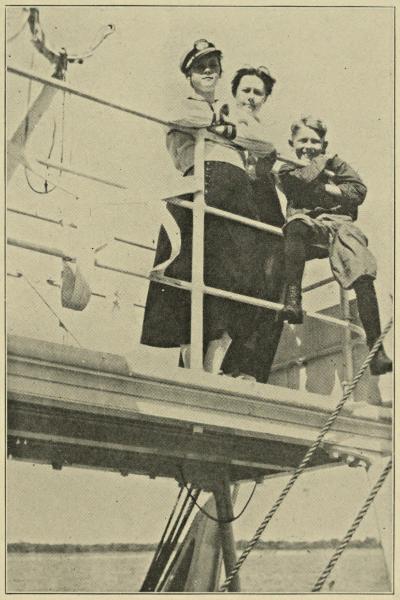
On Board Ship
To me this taught a lesson. The big ship Salvation has pulled into the harbor of the needy, the needy one comes in his little row-boat of trouble and cries for help, and the gang plank, the Gospel of love, is let down to him, and he jumps on and is saved. So, as we go among these needy people, in their little old row-boats[55] toiling on the angry waters of sin, we hope to see the dear old Gospel ship of Zion pull into many a harbor, and lower the gang plank of love and mercy, and see people jumping on and coming aboard for the glory-land. For truly, Jesus is coming soon, and what we do we must do quickly, ere they perish.
At another port we had to wait a day for the unloading of cargo. Many natives came to the ship to sell birds and different things, and we had a wonderful opportunity to give out the Word of God to them. How eager they were to hear of the love of God to save them. One old man came up out of his little boat and said. “Are there many people in your country who know about this great God, and how He sent His Son to die for us?” We told him there were many who knew about it. Then he said, “Why don’t they come and tell us about it and help us to find Him.” We were speechless, for we knew there were few who would leave all to tell them of Jesus and His power to save.
“I’ll Be Waiting for You When Your Ship Returns.”
Several little boys came on board from the many boats and lighters, and played with Carl. He brought out his little train, that ran on a track. They had never seen anything like that before, so they spent the day with him. We gave each one tracts and a Testament to carry home. How their little dark faces did shine with delight when we told them of the love of Jesus for every[56] one of them, and how God had sent us to tell the people to get ready, for He was soon coming back to earth. One little fellow was very much interested, asking many questions about the Bible and the tracts we had given him.
Just then the bell rang, and orders were given for every visitor to get off, for the ship was ready to go. As this dear little fellow took Carl’s hand and shook it he said, “I will be waiting for you when you come back. I will wait every day till I see this ship return, and then you can tell me more about Jesus and how to find this peace you have.”
He rowed away in a small boat, and, as far as we could see, we saw his little hand waving, and heard him saying, “I will be waiting for you when you come back.”
How we wept, for we knew we would not come that way again, and realized that the little fellow might never again hear the Gospel. Shall we fail to go to them with the bread of life?
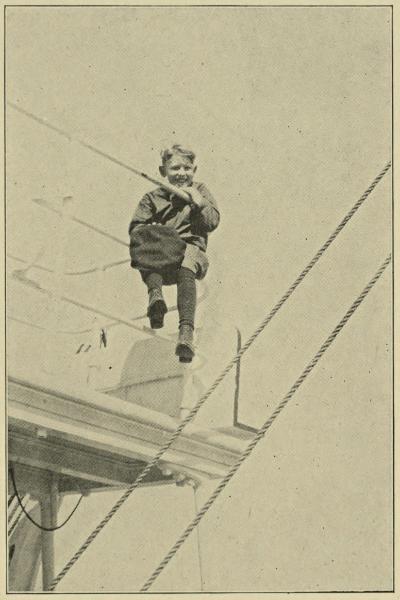
Carl on bridge of ship at sea
We reached Manzanilla on January 19th. Pulling ourselves up on the dock out of the little boat that brought us ashore, and walking a short distance, we came to the street on the water front. It was filled with people who had gathered to see the ship come in. With eager faces they watched the unloading of the cargo. We thought if only the many launches and boats that had gone to the ship for passengers and cargo could bring messengers and messages to this hungry people’s souls, what a blessed thing it would be!
We walked through the little city. The streets were filled with barefoot men, women, and children, many of whose clothes were ragged and dirty. Many pigs and sick dogs were roaming about eagerly hunting food, which appeared to be scarce. Our hearts were touched. As we looked up to Heaven there came a cry from my soul for the deliverance of these people.
Our attention was attracted by the ringing of a bell away up the mountain side. There we saw a small white Temple. The people began to swarm up there, answering the call of the bell. We went up with them. As we stepped inside the great iron gate that is kept closed at all other times, but was now opened for the people to enter, we saw the poor barefoot, ragged creatures enter, and kneeling down, make the[60] sign of the cross and worship the tall image before them, then rise to their feet and pass out.
The floor of the temple was dirty, and the seats covered with dust. We were made to think of the Scripture in Isaiah 1:6:
“From the sole of the foot even unto the head there is no soundness in it; but wounds, and bruises, and putrifying sores; they have not been closed, neither bound up, neither mollified with ointment. Your country is desolate.”
Surely the whole country is devoid of the power and glory of the God who made them in His own image.
As we stood there in the gate of the temple, we saw, high up on the mountain, the American flag waving in the ocean breezes. The flag was on the home of the American consul. It seemed to speak of freedom for that poor suffering people.
Oh that God’s children, who have been touched by Divine power and filled with God’s love, would go in upon the wings of faith and prayer, lift the blood-stained banner of Jesus, and wave it o’er this desolate land till it resounds with the falling of the Latter Rain, which is able to make it bud and bloom and bring forth fruit unto eternal life!
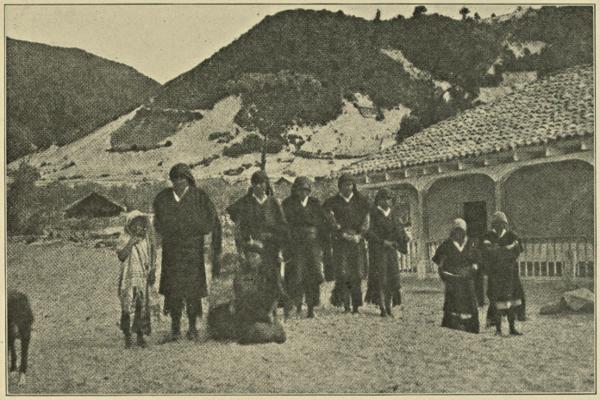
Some natives of a tribe in Guatemala, C. A.
Upon returning to our ship the burden was so heavy on me that I fell on my knees and cried to God to save these people. Then the Lord said,
“What thou seest, write in a book, and send it unto the churches.”—Rev. 1:11, 19.
We saw men with bands around their heads holding great packs on their necks. They were carrying loads from the boats which were bringing the ship’s cargo to shore. Truly they were pictures of the spiritual bondage of the people staggering under their burdens of sin, and with the yoke of the devil on their necks.
Here God gave me the interpretation of the vision which I had when I was saved, fifteen years before. From under the altar where I was kneeling I saw a great white cloud boiling out, full of upstretched black hands.
We were in Mexican waters and there was some trouble at this port. We expected to stay there about two days. Everyone was cautioned to be careful not to do or say anything that would stir up trouble. As we had been giving out tracts and Bibles at every port as we came down, we thought to do the same here, but we were told it would be dangerous to do so for it might cause a disturbance.
As we sat there and saw the dear people come down to the boat to sell things, our hearts were stirred, for we saw them as sheep having no shepherd. A group of fruit peddlers was sitting near. Taking some Spanish tracts and Testaments, I went over and talked to them as much as I could with my limited knowledge of the language, and gave them Gospel literature. A crowd gathered around, each holding out a hand for tracts. Even the custom house officers dressed in white, as is customary in the tropics, came over. The people came running from all sides, till soon I was pressed upon by them. Some flat cars were standing near. I climbed upon one of these to get out of the press, but the people climbed up, too, holding out their black hands for the little messengers. There must have been two or three hundred crowding around.
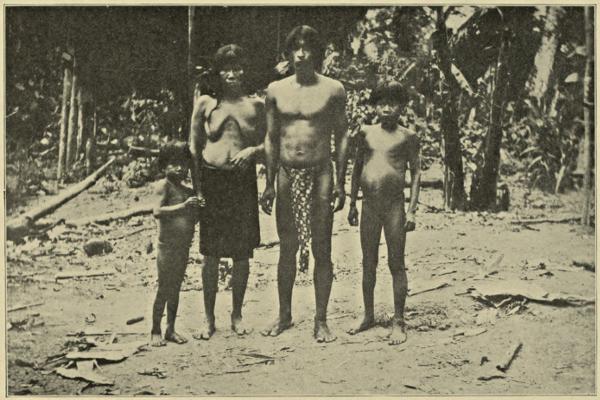
“Come over and help us”
As I was up there on that flat car looking down upon the poor hungry souls, holding out their black hands for the Bread of Life, I began to weep, and to speak in tongues. God spoke through me in Spanish to these dear hearts, telling them the story of the cross, and how and why Jesus died for us. It must have been an hour that I stood there in the hot sun, talking to them. They wept and begged for more tracts to carry home to their loved ones. One man, who could speak English, said to me, “We did not think you could speak our language so well,” then he told me what I had said.
And there my vision of the white cloud full of black hands was interpreted. Dressed in white, they were reaching out black hands for the gospel. Shall they call in vain? Oh, no! We will carry to them the gospel, the blessed story of Jesus and His wonderful love. They, too, shall be saved and ready when He comes.
In many places in Mexico the power of God is falling. In one place a Mexican heard the gospel and was saved. He began preaching to the people. The Holy Spirit fell, and about a hundred received the Baptism. They were calling for a missionary to come to them. Shall we linger? Shall we not answer these calls?
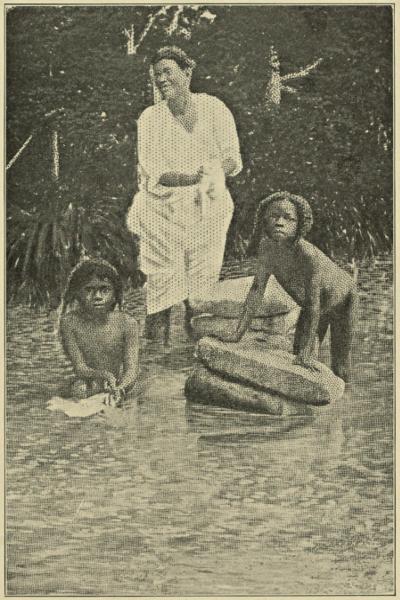
Taking their morning bath
The people worship many different kinds of idols. Sometimes they walk hundreds of miles to do penance to some stick of wood or piece of stone which has been set up by the priests.
We met one young man who told us he had crawled three hundred miles, carrying a golden dish, valued at ten thousand dollars. This idol to which he crawled is in Costa Rica, and is called “The Virgin of the Angels.” The people have been made to believe that this little image of black stone, three and a half inches high, can perform all sorts of miracles such as opening blind eyes, healing the deaf, and driving away evil spirits. The temple in which this idol is kept was built at a cost of one million dollars. Once a year this “Virgin of the Angels” is carried to visit all the other santos (saints-idols) that she may bless them, and give them more power for the ensuing year. This immense temple is literally lined with gold and silver dishes and cooking utensils brought there by the rich inhabitants of the country, with the hope that the image would bless and heal them. Just outside the temple are stacks of corn, bananas, coffee, sticks and stones, which the poor people have brought that they, too, might have their sins taken away and their diseases healed.
They are begging for the Gospel. Their call comes to you and me,
“Come over and help us!”
and God asks, “Who will go for us?” Isaiah 6:8. Who will leave home, friends, and loved ones, and go out, not knowing whither they go? They will have to eat native foods that are unclean and unwholesome, and which may cause fevers and various sicknesses. They may have to sleep in old dirty native huts, where mosquitos, scorpions, bats, and vermin will attack them. Nevertheless God is calling now, as He called in Isaiah’s day, “WHO WILL GO FOR US?” Jesus is Coming Soon! The message must go forth regardless of the cost.
As we went aboard the ship, the Lord said to me,
“Cast thy bread upon the waters.”
Many dear souls were reached by the tracts on the different vessels upon which we traveled. To God be all the glory! Eternity alone will reveal the number who received the Gospel in this way. Passengers and crews alike read the tracts, and called for more. People from all parts of the world have taken the little messengers with them and as they have grasped our hands with a hearty “Good-bye, and God bless you in your work,” our own souls have been blessed and refreshed, for we have seen the Word of God, that liveth and abideth forever, finding its way into the hearts of men and women.
People who were sick and afflicted, traveling in search of health, have heard the message of healing through Jesus Christ, and have been[73] healed, as we told them of the body of Christ that was broken for us, and that by His stripes we were healed. Souls who had sought comfort and rest in various religions, hearing the story of the cross, and of how Jesus died that we might live, have accepted Him, and gone on their way rejoicing.
“Cast thy bread upon the waters, for thou shalt find it after many days.” Eccles. 11:1. We know that when we reach the pearly gates of Heaven we shall see many who have been redeemed from sin, because they read and heard the Bread of the Word, which we cast upon the waters.
While we were giving out tracts and Testaments to the people who came to sell fruit and birds in one port in Mexico, we met a Mexican who had never heard the Gospel, or seen a Bible or a missionary before. I gave him a tract, in his own language, on the second coming of the Lord. He looked at the tract, then at me, and then said, “What is this for?” I told him it was a tract telling of the soon coming of Jesus back to this earth again. I could not speak or understand much Spanish. He said, “I will read it, then bring someone to interpret for me, for I want to know more about this.” He went away, and in a few minutes came back with a young man who could speak English, for his interpreter.
He asked me where I heard the Lord was soon coming back again. I said I had read it in the Bible, and that God was pouring out the Holy Spirit upon the earth in these last days;[74] that thousands were receiving the Spirit, and that the Holy Spirit is revealing to the people that Jesus is coming soon.
He then told us he had been going all over Mexico, Central and South America, visiting idols and saints, walking several thousands of miles, carrying heavy loads of gifts to these idols in the attempt to get peace of soul, but had not found it. At last, sick and weary, and in despair, he gave up.
He was wondering if there were a God and had asked that if there were He should make Himself known to him in some way. Then he said he saw a great, strong man coming up out of the sea, so powerful that he could make every nation of the world bow to him. This man destroyed the Pope of Rome and the Catholic Church, built a great church for himself, and sought to compel all the world to worship him, but there were many who would not do this, so he made war against them, killing them all, and the earth was covered with blood. The people called on God to stop the terrible war and take away this man from the earth. Then Jesus came on a great white horse with many angels following him, destroyed the wicked man, and set up a beautiful kingdom of peace, in which everyone was so happy, and the whole earth became a great beautiful garden.
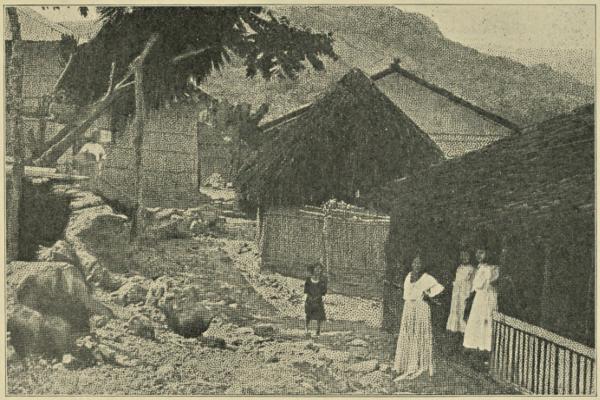
A Native Village
Then this Mexican said, “I felt very happy in my heart, and had such great peace of mind.”[77] He had prayed God to send someone to tell him more of this way. He said he was very astonished to find someone giving out tracts on the ship. Always before when he made his trips he saw only gambling and dancing, but this time he found people preaching the Gospel.
He went away happy, to tell his people he had found the Bible and the Way of Life. He talked to all the Mexicans on board, telling them how God had answered his prayer.
One man, who owned a gold mine in Mexico, and had been in the United States and was returning, told us, as we were giving out literature to the people, that we were the first missionaries he ever met coming that way. He said he had been in Mexico forty years, had made many trips back and forth, but had met no Christians in those parts before. He himself knew something of the Gospel, and was glad to have the papers, and told us of the great need among the people there.
Oh! shall not we who have received this great outpouring of the Spirit, cry, as did the holy ones in Isaiah, “Holy, holy, holy, is Jehovah of hosts!” till the whole earth be filled with His glory? As I write in the hot state-room of the ship, my soul is full of glory, and my hands are being moved over the typewriter by the power of the Spirit, while He tells me that Jesus is coming soon, that we must work fast, and open our souls to Himself until we are filled with His power and glory, so that the people with whom[78] we come in contact will know we have been with Him, and learned of Him.
A young man came to me and said, “I heard you praying in your state-room this morning. May I come in next time when you have prayer? I want to know about the Gospel.” We had given him a Testament. The next morning he came and knelt with us and prayed to the Lord to save him. He arose, with his face shining with the glory of God, saying, “Won’t you come to my country and tell my people about Jesus? My mother has been making long trips to worship ‘The Black Christ’ in the great temple on the Honduras border, but she hasn’t found peace. Won’t you come and tell her of this wonderful salvation?” We corresponded with him later, sending him tracts and papers, and he is going on with the Lord. Won’t you pray that God will raise up someone who will go to them with the Gospel before it is too late?
As I have already said, Central and South America are opening their eyes, and fast turning from Romanism. They are accepting Spiritualism, New Thought, Christian Science, and all kinds of false religions, because the true Gospel is not being preached to them. Shall we not awake, rise up, go forth with the message of the cross, and reach these people before they are destroyed with these awful things?
A man from Honduras, who had been in the States studying New Thought, was returning with several boxes of books to sell to the people.[79] This dear young man had never heard the Gospel. He said he found that Rome was keeping the people in ignorance. Having met some New Thought teachers in his country, he had been to the States and studied New Thought for a year, and was now returning to teach it to his people, who, he said, were anxious to have him do so.
We gave him a Bible, the first he had ever seen, and he read it every day. We talked and prayed with him until he was saved, for the dear old Word of God always wins its way into the hearts of men. He threw the New Thought books overboard and went on his way with tracts, Testaments and Bibles for his people, rejoicing that he had found the true God. Let us pray for this precious soul, that God will greatly use him. He is a finely educated young man, whose influence will tell on his countrymen.
Oh! how glad we were we had been led to take that boat, and had had the opportunity to give the Bread of Life to that hungry man! God had led us on that very ship, and certainly we were blessed as we cast the Word of God forth and saw many people running after it. There is a great ministry on the ships, not only to passengers, but also to the officers and crews. They spend all their time on the water, and do not have any opportunity to hear the Gospel, only as it is taken to them.
Another man, a Jew, was very sick, had been for a long time. He was traveling for his health. As my husband spoke to him about[80] the Lord and told him God could heal him, he said, “Well, I will come right into your room now and have you pray for me. I am suffering so, I can’t live until I reach my destination if I do not get relief.” He came in and we prayed for him, and anointed him with oil in the name of the Lord, asking God to touch his body. Instantly he threw up his hands and began to say, “Glory! Glory! Glory!” The power fell on him, and he was saved and healed. As he left the boat he took with him some tracts and a Testament, and, best of all, the glory of God in his soul.
He declared he was going to preach the Gospel, and he began right on the ship. He was so filled with the power and glory of God he could not keep from telling it. Here was one more poor suffering soul who received the Bread of Life that was cast upon the waters, and who went on his way rejoicing, to tell the glad news to other suffering ones.
Let us not be weary in well doing, but rise up in faith and go forth in Jesus’ Name, casting our bread upon the waters, for we shall find it bringing forth life.
A woman that I spoke to became so interested that she came every day for tracts and papers to read. I also gave her some good books on the second coming of the Lord, and on salvation. She, too, was saved, and went away with her suitcase full of the Word of God to give to her people.
Nearing Nicaragua, in the distance we saw three mountain peaks, and were told that was the Port of Corinto, where we were to land. As the ship moved on, we could see the light-house, its white head towering high in the air pointing out the way we were to go.
The scenery was beautiful. Cocoanut and palm trees lined the beach. The sea was calm and we slowly moved into the harbor, getting a good view of the little city spread out before us. Great peace settled down over our souls, and the Holy Spirit whispered to us that we were in His will. I stepped into my stateroom and opened my Bible, and this passage came to my sight:
“The Lord shall guide thee continually, and satisfy thy soul in drouth, and make fat thy bones; and thou shalt be like a watered garden and like a spring of water whose waters fail not.”—Isa. 58:11.
We had cabled Brother Schoenich to meet us, but our boat arrived two days earlier than scheduled, and on going ashore, we found he was not there. We went to work, speaking some English and a little Spanish, and making many signs and gestures. The next morning Brother Schoenich arrived, and worked faithfully, helping to get our things through the customs house. After seeing that everything was ready for the coretta (oxcart) ride to Matagalpa, we took train for Leon.
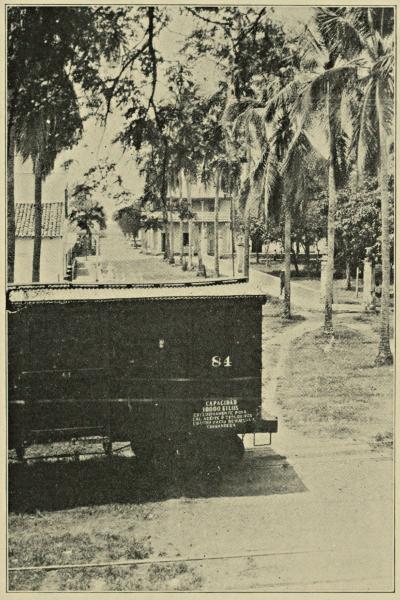
Picturesque Street Scene of the Port of Corinto, where we landed
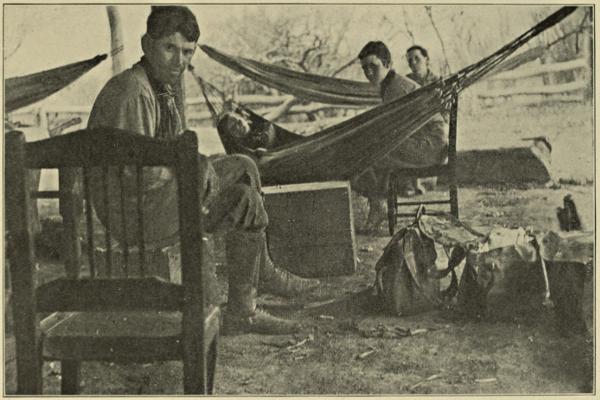
Resting during the heat of the day
Arriving at Leon we went to the home of one of the native Christians. The food was strange and new to us, but it came from a heart of love. The next day was Sunday, and a company of dear ones, who had been baptized in the Holy Spirit, met for worship. Brother Schoenich preached to them, admonishing them to stand true. They had no pastor, but were going on with the Lord.
Next morning we went to the market to buy food for our three days’ trip on mule back. We found some of the saints there. They were reading their Bibles, and witnessing for Jesus in the midst of the priests and thousands of Catholics. They had their walls covered with scripture mottoes. When saved, these people make good soldiers for Jesus, enduring hardness joyfully. They remember the pit from whence they were digged.
Bidding them good-bye, we prepared our lunch, mounted our mules, and rode until about ten o’clock that night. Stopping at a camp ground for coretta travelers, we lit our candles, ate our meal, strung up our hammocks, and lay down to rest amid the lowing of the many oxen. All coffee and freight is moved to and from the interior on oxcarts (corettas in Spanish).
The next morning we made our toilet in and by the large trough where the mules and oxen were watered. After eating breakfast under[88] the shed of the native hut, we were off for our day’s travel.
At noon we stopped again at a little house on the hillside for food and water. While waiting for the meal to be prepared we strung up our hammocks for a rest. Our bodies were very tired, as we had never ridden horseback before. By this time we felt better down than up. Brother Schoenich, being accustomed to these trips, did not tire so easily, so he gathered the family together and preached to them. It was the first time they had heard the Gospel.
About five o’clock we again mounted our beasts, and traveled until midnight. We passed over some rough country, the many wild parrots and birds seemed to be screeching and singing to the dusty, wayworn travelers. Once in a while we got a hot breath from the great volcano in the distance whose smoke we could see billowing up towards the clouds.
Again we had supper by candle-light, then hung up our swinging beds in the corridor of an adobe house, and rested till the dawn, when we heard the now familiar alarm, the braying of our faithful mules, who seemed to want to be traveling. We arose, dressed, and soon were off.
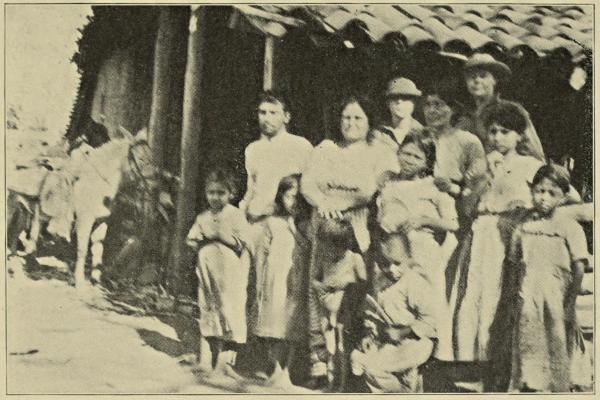
Where they heard the Gospel for the first time
At noon we stopped again for rest and for food. The food they offered was so seasoned with flies and worms that we decided to buy a chicken and cook it ourselves. We bought a “fryer” but it proved to be an old hen of many years. We were invited by our hostess to come into her[91] kitchen to fry our fowl. As we were trying to get the earthen pot fixed on the fire, which was made in a sort of furnace in the corner, the smoke poured out into the room.
We noticed some strange sights in that kitchen. In one corner a nice fat pig was having his noon-day swim in a trough of slop that had been arranged for his benefit. Meanwhile a large red rooster lifted up his merry “cock-a-doodle-doo” above the noise of all the rest of the fowls and animals that filled the place.
We managed to get the old hen smoked as well as fried, and as we went out to place it on the small table which had been fixed for us, we discovered Brother Schoenich had gathered a company together and in his enthusiastic way was preaching to them, showing them that worshiping the Virgin Mary and the santos, (saints), and learning catechisms, etc., was not the true religion of the Bible. They listened with great interest, asking many questions about the Bible.
After our meal we lay down on some boards to rest, and fell asleep, only to be awakened by the chattering of many little voices. On investigating we found the children were having school in one room, all reading at the same time, taking turns at the door with a stick to keep the pigs and chickens out. We left there and traveled until dark, then stopped for the night. Rising early the next morning we traveled several leagues, and then came in sight of the lovely little city of Matagalpa, nestling at the foot of the mountains.[92] The only evil and unlovely thing, there, was man, who has sinned and gone far away from God.
Dear Sister Schoenich and some of the native Christians came out to meet us, as Isaac came out to meet Rebekah. We alighted, had a drink of water, and rested a little before going into town. We certainly were glad to see the entrance-gate to our new home, which was, I think, the largest gate I had ever seen. We thought of our entrance through the gate of Heaven, after our long, weary journey through this world of sin and sorrow.
On dismounting, we were met by some more of our dear brown-faced friends who had gathered to greet the new missionaries. When we saw their faces shining with the glory of God, and heard them sing the praises of Jesus we were refreshed in soul and body. After a few hours of rest we were able to go into the meeting and help push the battle for our King.
We will work here with Brother and Sister Schoenich for a while, for they have a large work, and need help. They are much worn in body after almost eight years on the field, and need a furlough. Pray for us. The fields are white unto harvest, and the laborers are few. We want to bring some glad trophies home to God.
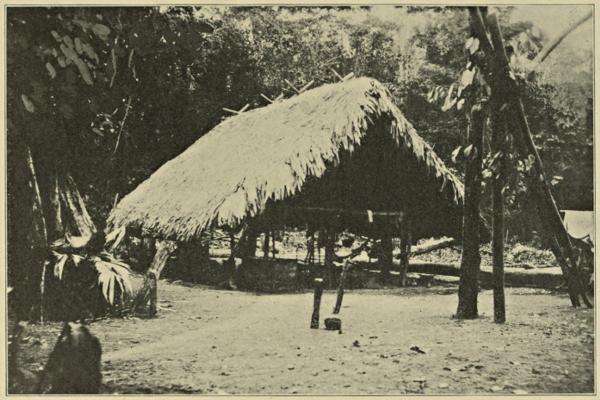
An Indian Hut Where We Preached the Gospel
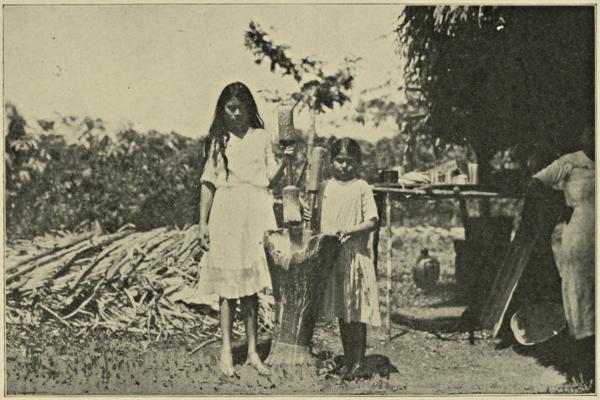
Indian girls grinding corn for tortillas
Our stay in Matagalpa was a very pleasant and profitable one in many ways. It was a great pleasure to see the way God worked among the dear natives. They were delighted to come and worship the Lord, and anxious to see others of their people brought into the fold. The awful sins and idolatry of these people are beyond our power to describe.
We had been there about four days when Brother and Sister Schoenich were called to one of their other stations over in the mountains. Perhaps you can imagine us poor little folks there without the language, taking care of the station and carrying on the meetings while they were away. Rising very early to help them off before the sun was hot, we bade them good-bye, then turned our faces toward Heaven and asked God to help us, for we were there, and must be brave soldiers, not get frightened and run away from the battle. The Holy Spirit fell upon us, and the Lord spoke to us saying He would be mouth and wisdom unto us.
As we stepped into the corridor leading from the yard, we met our first problem, which was to speak to one who knew only the Spanish language, with no one to interpret for us. The man from the finca (little farm) had come in to ask for the hammer. He talked and laughed,[98] and we all talked and laughed, and tried to see whether we could get what he wanted. We brought him the horses, the harness, and almost everything in the kitchen. At last we took him into the tool room to let him see if what he wanted was there, and he picked up the hammer. Ever after that we remembered the Spanish word for hammer. But, oh my! there was a pile of things lying all over the corridor to be picked up and put in their places. However, it was a very effectual way to get the language.
Next the girl in the kitchen must be told what to cook for dinner. Into the kitchen I went, knowing the mountain was before me, and must be surmounted, and I meant, by the help of the Lord, to go over the top. Putting out the things for her to cook, I showed her by signs, as much as possible, how they were to be fixed. She did pretty well and the meals were good.
But the worst was to come. The next morning was Sunday, and there were the dear natives gathering into the chapel. What were we to do? Oh, we felt so helpless! Down on our faces we went to ask God to come upon us that day, and fill us with his power and pour out the Spirit on all the dear people. We took our Spanish song books, and went in, and played and sang the hymns the best we could. We had learned to say, “Let us pray,” so we knelt down and, we in English, and they in Spanish, poured out our supplications before the Lord, and the power fell. We were there over two hours, just worshiping the Lord, and the language was well understood by all, for the Holy Spirit did the speaking and worshiping, and we did not make an effort to do anything. Oh, how we did feel the mighty presence of the Holy One that day!
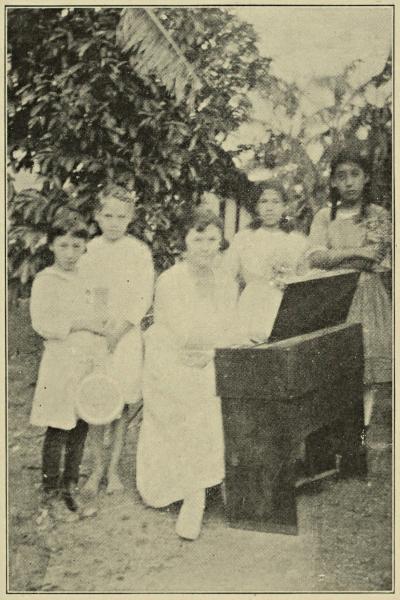
Alma and her music class in Matagalpa
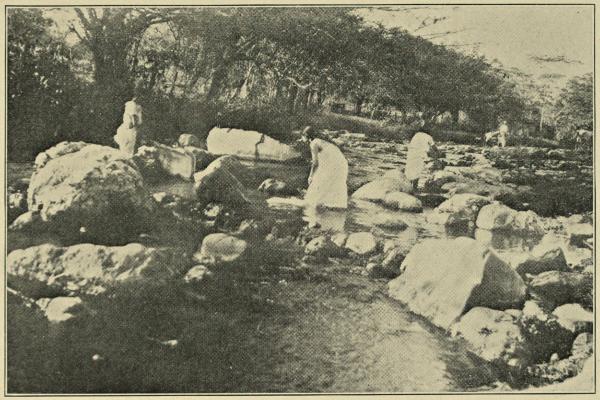
Washday at the river for native women
Their only way to clean clothes is to rub them on a flat rock
The next day many new things came up. First there was the laundry to send out, then the marketing to be done. We all rose early, got our Spanish grammars, and, by the time the woman came for the washing, we were ready to speak a few words to her about it. Then we studied what to say at the market, and my husband came home with some of the things we wanted, and some things we didn’t want, but we were learning the language right along.
I wanted to season something with butter, so called to the cook to hurry and bring it to me. I thought she was awfully slow. Hearing a great noise behind me, I turned and saw her leading the horse into the kitchen. I had asked for the horse, instead of the butter, to put into the cooking. After a hearty laugh from all of us, I went into my room for my Spanish grammar and looked up the word for butter, to be sure I should not make that mistake again.
Things were going pretty well by this time, except for the few mistakes we made occasionally.
The next thing I called for was a spoon, with which to eat my soup. They brought the broom in, and laid it on the table. I couldn’t very well eat soup with the broom, so sent it back and kept asking for a spoon, until either I[104] had the word right, or they guessed what I wanted, I don’t know which.
We employed a teacher and every morning for a couple of hours we studied the language. This was a great help. We soon were able to ask for butter or spoons with no such mistakes, and before long we could sing and read our Bibles quite well, also give our testimonies in Spanish. From day to day we could note the progress we made in learning the language.
Then came the day when Brother and Sister Schoenich returned home. They were tired and worn, for they had been working very hard in the meetings while away, and we wished we could take all the burdens from them, and let them rest. But there were many things to attend to. They went right to printing the paper, toiling almost day and night, not sparing themselves one moment. These dear souls have come into this dark land of sin and idolatry and laid down their lives for the Gospel. Let us hold them up in prayer and by our means. Let every reader of this book breathe a prayer to God for these dear workers. Their bodies are tired and worn and they need a rest very badly. May the Lord of the harvest send forth laborers to this dark land to take their place long enough for them to have a furlough. Many were the precious lessons of faith and love we learned from them for which we praise God.
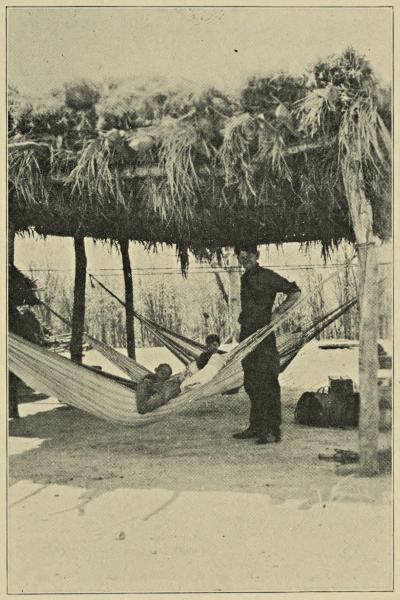
Where we stopped for the night
Note the glare of the sun on the white sand
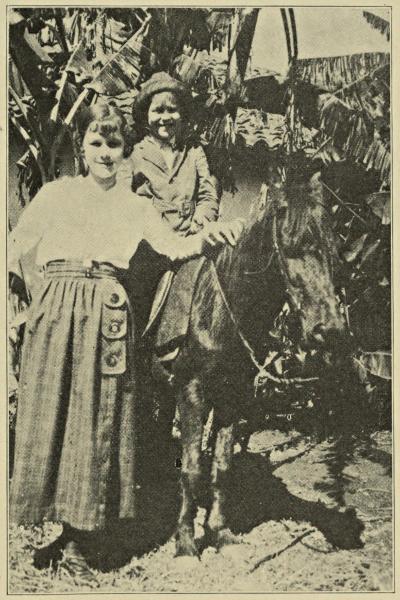
Alma and Carl among the banana trees
The days went by. Three months passed. We had no thought of leaving, until one day while we were out giving tracts to the Indians as they passed by, God spoke to me and said, “Go to Leon.” We didn’t see how we could possibly do that, for we had so little of the language, and no money to go with, and it would take at least seventy-five dollars. But as we waited before the Lord, we were sure it was His dear will. Then we asked for the means to be sent for the oxcart to carry our baggage over the mountains. The next mail brought a draft for just the amount needed. Brother and Sister Schoenich told us that before Sister Yeagges’ death she had said the Lord showed her we were the missionaries for Leon. At that time we had never met any of the workers, but had been merely corresponding with them.
Then there was the packing of our things in preparation for the trip, which was a long tiresome one over the mountains and plains under the tropical sun. We worked hard, and in one week were off. Brother Schoenich took us down on his mules, which was very kind of him. His heart is in the work in this country, and he has been willing to make every sacrifice to get the Gospel to these people.
After seeing our trunks and baggage loaded on the oxcart, and started on the way, we set about to prepare a lunch for the trip, as the only food available while traveling through the country is tortillas, (corn cakes), and frijoles, (beans), and many times one cannot even get these, for the people are very poor, many of them living on roots and leaves from certain trees.
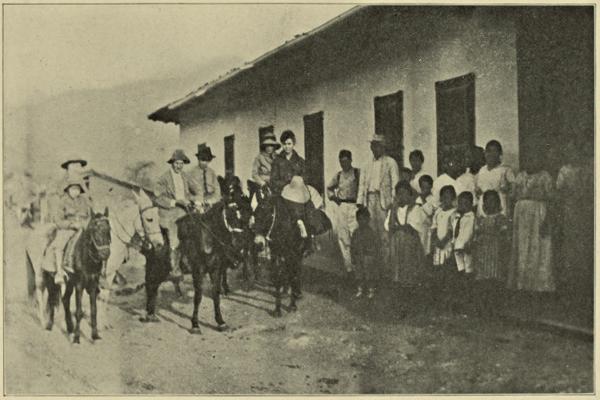
Leaving Matagalpa
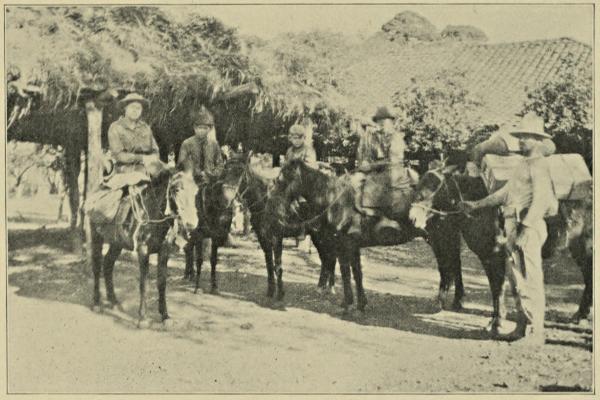
Leaving in the early morning for a day’s journey
After saying good-bye to Sister Schoenich, and to the native Christians who had gathered to see us off, we mounted our beasts and were soon on our way through the little village, waving good-bye to the many friends we had met while there. The road being very good for some distance we had several races, and we remarked how clean we then were, but how different we would look on reaching our destination. The sun was just sinking behind the western hills and we could see the natives driving in the animals for the night. As we rode on we saw the hills were all on fire, for the custom there is to burn all the shrubbery before planting crops. As we saw the great flames winding their way up the tall trees, and flashing into the air, burning up the thorns and briers, and leaving the ground clean so the seed which was to be planted might grow, there came to my mind the thought that even so, the power and fire of God could fall on that country and[115] burn up all the awful sin and idolatry which was binding those people, so that the Word of God could be sowed and bring forth fruit in their lives. And there arose from our hearts, a cry to our Heavenly Father to send out His messengers into that needy land to light the fires of the Holy Spirit, till sin should be burned, and the people be freed.
Riding until about 10 o’clock, passing over some very rough road, we reached a little village. Being very tired and hungry, we decided to stop here for the night. We hung our swinging beds up in the shed of the native hut, which was used for a saloon, and after eating our scanty meal by candle-light, we committed ourselves to the keeping of the One who never slumbers nor sleeps, then lay down to rest amid the talking of many other travelers, who were stopping there for the night. Each one carried in his belt a big revolver, and a machette (a large knife), which all the people, even the children, carry, and with which they kill one another, when they become angry. Nevertheless we were conscious of the angels camping around us, and there was no fear in our hearts.
Awakening next morning very early, we arose and brushed off the dust which covered us from the constant traveling on the road, near[116] which we had been sleeping, for the people travel all through the night, as in the day the sun is very hot. We ate our breakfast again by candle-light, and after our morning prayer, we mounted and were off for a day’s trip. Though our bodies were very tired we went on singing and praising God for the glorious privilege of carrying the Gospel message to that dark land.
We rode until about noon, when we came to a stream of water which looked very refreshing to us. The poor animals were so glad to see that water that when they got in it they drank, and drank, and drank. We spread our lunch on the sand, and washed ourselves and drank heartily, for that was the first water we had seen for two days except the little the natives had given us to drink. Then came one who told us that just upstream all the dead animals of the neighborhood were thrown in. But we claimed the promise, that “If ye drink any deadly thing it shall not hurt you.”—Mark 16:18.
After a rest for ourselves and beasts, we were again on our way. The sun being very hot by this time we prayed that the Lord would send a cloud over it, which He did. Praise His Holy Name! “The sun shall not smite you by day.” We went on, passing over great rocks and boulders. The mules had to climb up and over them until at times it was impossible for new and inexperienced riders as we were, to stay in the saddles. However, some of us missed our saddles only a few times and took a tumble.
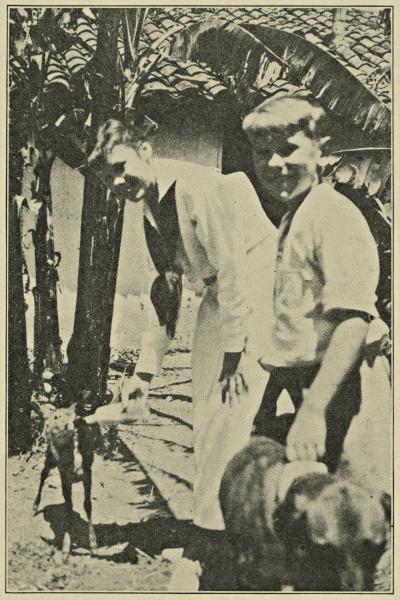
Alma and Carl feeding the pet deer
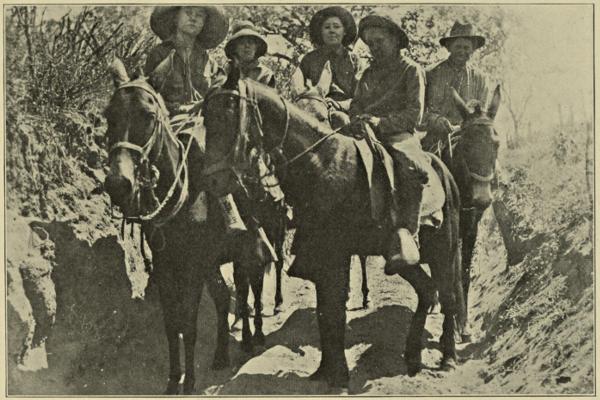
On our way through the mountains
Sister Finney, putting her confidence in a broken part on the back of her saddle, fell off as she was going up a steep place, and after standing on her head for an instant, rolled down the bank, the mule stepping on her chest. Rising, she praised the Lord that He had sent His angel and delivered her. She mounted, and we were off again, after finding she was not hurt. Evidently I did not have so much faith in the matter of falling off mules, and rolling round amid the rocks, for while passing through a very deep cut, with high banks on either side, the mule which I was riding pushed against the bank, and having a bad saddle, I lost my hold and fell under the animal’s feet. She was kind enough not to step on the poor missionary who was such an inexperienced rider, but who had been called to learn, and she very carefully stepped over me. I was picked up, and, after a little prayer-meeting there in the dust, I was able to remount and ride on to our destination, thirty-five miles away. God wonderfully blessed me and the Holy Spirit came upon me, and I sang and praised the Lord in tongues—with interpretation. All the way I felt the strong arm of Jesus upholding me. On arriving my foot was found to be badly broken and crushed, and so swollen that I could hardly remove my shoe.
Praise the Lord! He came down and blessed my soul, and touched my body! How His love did burn in my heart! As the devil seemed to be angry I felt that I was surely called to[122] preach the Gospel in that place. The power went through my poor, crushed and swollen foot until it was entirely straightened, for it had been so twisted that my toes were behind, and my heel was in front. I could feel the bones set and straightened as the mighty power surged through like bolts of electricity. I did not stop preaching although for a time I was unable to put my foot to the floor, but the people came to me, sitting there in the house, to ask about the Gospel.
One night I felt the healing touch so strong that I knew I could walk, so, arising next morning, I attempted to put on my shoe, but it would not even go over my toes. Nevertheless, I praised God, laced the shoe on the other foot, ready to walk, and then kept pulling at the other shoe until it went on. Soon it was laced up and I was ready to walk. I went into the meetings, and have been going ever since, and that foot is as good as it ever was. How we do praise Jesus that we can suffer for His name’s sake. No warrior returns from battle without wounds, or marks of hardships endured, and one national hero declared he was sorry that he had but one life to give for his country. Much more should we endure and give, who are fighting for our Heavenly country under the leadership of our great Captain, King Jesus.
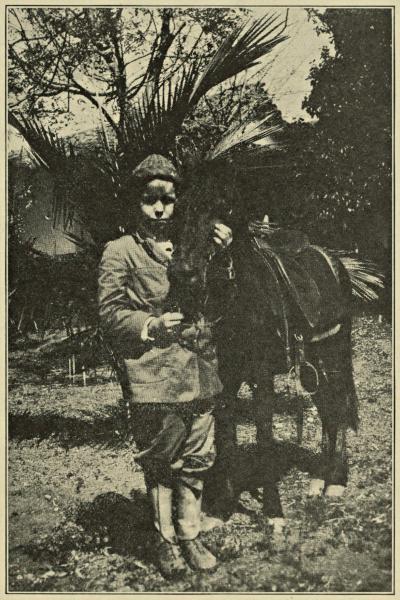
Carl with his faithful pony
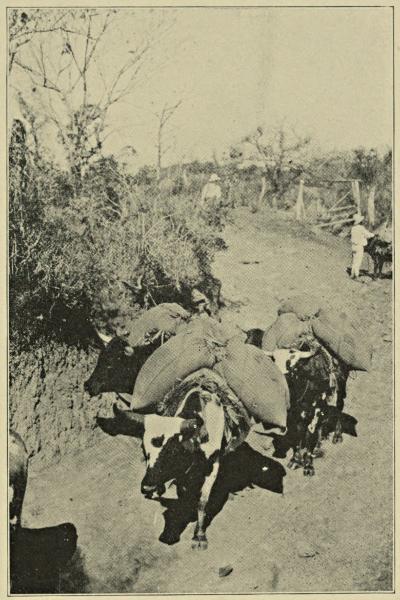
Bringing coffee down from the mountain plantations
We have heard the Macedonian call, “Come Over and Help Us,” and the love of God constrains us, so “onward we must go, regardless of the foe.” Truly these dear people are calling for[127] us to come and give them the Gospel. Shall we fail and allow them to perish without the knowledge of the love of Him, who so freely died to save them?
Late one afternoon we arrived at a small village, and being tired from the hard day’s travel we decided to stay for the night, but when we stopped, ready to dismount, we were told that
Robbers
had swept down from the mountains on the towns and villages of that district, had robbed the people, and driven off their stock. The soldiers had been sent out, and already one battle had been fought, and more trouble was brewing, so it was very dangerous for us to be traveling. We looked to the Lord for guidance, and felt that we must lose no time, but taking the Blood for our protection, should move on. Arising at two o’clock the next morning we went over the road on which the robbers were supposed to be, through a dense forest, but saw nor heard nothing except the many parrots and birds, screeching and singing.
We made seventeen leagues that day, crossing mountains and plains, stopping at noon at a little hut by the roadside for food for the beasts and rest for ourselves. We were received with much hospitality by these people, with their bamboo covered house, its walls composed of a few sticks stuck up at intervals. The entire inside had on its dress of mourning from the smoke from the family cook-stove, which was[128] a pile of rocks in one corner. While the woman was making us a fresco of gourd seed, (a favorite drink they make there), grinding the seeds on the tortilla stone, the old mother pig and her babies were having a real jubilee under the rickety table. In that country hogs seem to be the family pets, for in every house there are many of them. The beds were merely a few sticks covered with a rawhide. Other sticks surmounted by a rough board served for a table, and a black smutty pile of rocks was the stove. These articles completed the home furnishings. The host was poor, but oh, how he and his family listened to the Gospel story! This is the picture of thousands of homes in that country. The people are exceedingly poor, but hungry for the Bread of Life. How we enjoyed preaching the Gospel to them! Although there were numerous hardships to endure, it was sweet to be in God’s will, and to tell these dear ones of His great love for, and His desire to save them.
Reaching our next stopping place late in the evening we camped for the night. After we women were in our hammocks, and the men had seen the animals put away for the night, they went for a swim in a nearby stream. When their swim was finished, they found the stream was the home of some large
Alligators
but, praise God! He is the same as when He stopped the lions’ mouths for Daniel. Certainly He does care for His little children.
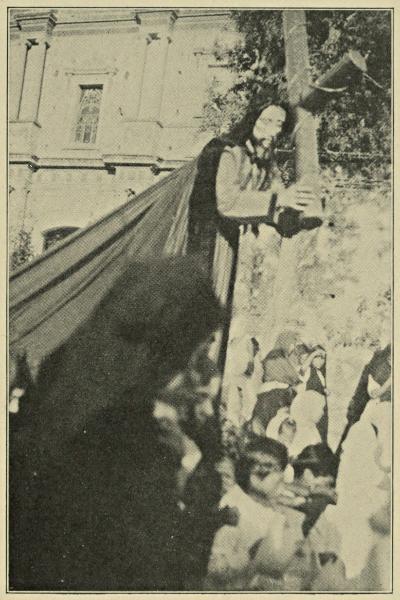
The only Jesus they know
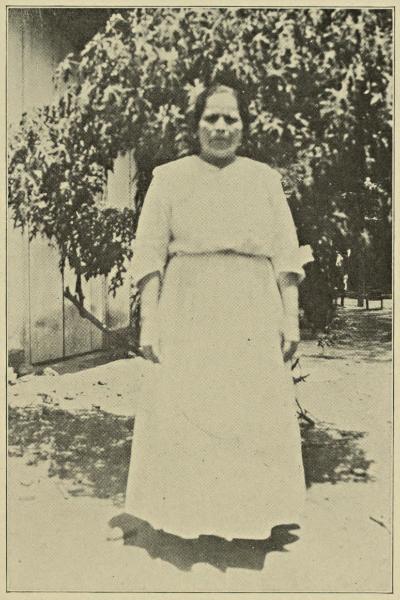
One of the first to accept the Gospel
Rising before daybreak we sent up a thanks-giving to our Heavenly Father for His safe-keeping through the night, and asked Him to protect us that day. Then we loaded our beds and other belongings upon the mules and went on our way.
That day’s journey brought us over a part of the country which was covered with great rocks and boulders thrown from Nicaragua’s largest volcano, El Momotombo. In the distance we could see the volcano belching forth smoke, and the heat was intense. About one hundred years ago this volcano completely destroyed the city of Leon, leaving a great lake filled with water, which is there today.
The dust was very deep in the roads, because of the extensive traveling. It rolled up about us in a great cloud. Many times we could not see each other a few feet away. We resembled a miniature whirlwind coming down the road, and surely we were a whirlwind coming against the devil. The enemy would fain stir up a storm to strangle God’s people and prevent them from invading the territory he has so long held, but we would not be intimidated. Souls were at stake. They were being held in prison, behind bars of iron, but their cries had reached Heaven and God had sent some of His messengers with the glad news of freedom. The message[134] must be delivered, regardless of the cost, so over mountain and plain we went, covered with dust, faint from much traveling through long, hot days, but on to the people with the message that Jesus died to set them free.
Toward dusk we came in sight of a little adobe house, and were told that we might stop there for the night. How nice it was to see a place where we could rest our tired bodies, wash ourselves and comb our hair. For three days we had been unable to comb our hair or wash ourselves for water was too scarce. How wonderful it will be when we earth-travelers pass on our way to that City which hath foundations, whose builder and maker is God, where we shall see dear Jesus and hear Him say, “Come, My children, into the mansions I have prepared for you.” The residents of that city “shall hunger no more, neither thirst any more, neither shall the sun light on them, nor any heat. For the Lamb which is in the midst of the throne shall feed them, and shall lead them unto living fountains of waters, and God shall wipe away all tears from their eyes.”—Rev. 7:16,17. How blessed to know Jesus has gone to prepare a place for us! How the very thought thrills my soul, and causes me to want to work to help bring others into those mansions!
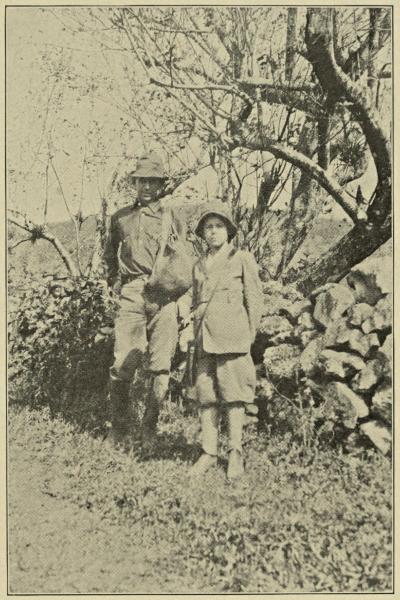
Carl and his father, as they distributed tracts to the Indians by the roadside.
While talking with the natives, they told us that
A Large Tiger
had come down from the mountains and, after killing two cows and injuring several more, had escaped. They were greatly frightened, as the animal was still in the neighborhood, but we lay down under the shed, and went to sleep, awakening just when the sun was coming up through the trees. We hustled and dressed, and after ordering some hot milk from the people there, we mounted for another day’s journey. We went down the road in the direction which the tiger had taken. The natives warned us that we were likely to meet the ferocious animal in the forest not far away, but we went on, singing the sweet songs of Zion, and trusting ourselves to His keeping, who said, “I will give you power over all the power of the enemy.” A tiger was a very small thing compared to the awful monster of sin which had ravaged the whole country. We realized that the King’s business demanded haste, so we passed on, and rode over the dusty road unmolested. The blessed Holy Spirit filled our hearts with joy at the thought of soon reaching the place where we should have meetings with the dear faithful little band of Christians who were awaiting.
Our arrival in the city aroused much curiosity among the people. As we passed through the streets they came out of their houses and followed us to see where we were going. When we came in sight of the house where lived a Christian woman, who had suffered much at the hands of her people, she came out to meet us. The power fell on her, and she danced for joy, and we wept and shouted. A crowd soon gathered to see what had occurred, and we had a meeting right there, telling them of the Savior’s love and His willingness to save them from all sin, and to present them faultless before His Father. These people had persecuted this dear sister for ten years after she was saved. They would come and whip her, throw her goods into the street, and tell her they would kill her if she did not turn back into the Roman church, but she stood true, and now had the Baptism of the Spirit, and in her house we had our meetings.
We slept on cow hides for beds, with a straw mat under us. We ate our food out of gourds for two weeks until our things came and we could get a house. It was sweet to be in the Master’s dear service.
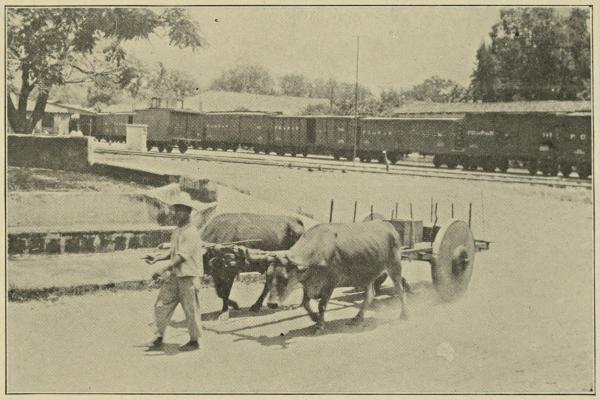
Street Scene in Leon
The city of Leon is anti-American because it is the headquarters of the Liberal party, which is trying to overthrow the rule of the church of Rome. The United States appointed a president[141] twelve years ago, thus stopping the revolution then in progress. As the president is a church man the Liberal party hasn’t much love for an American.
This was a difficulty which we had before us. Not only were missionaries hated, but we were American missionaries, which was far worse. We looked to the Father for a house in which we might live, and preach the Gospel to these dear people. A man came to us and said we could have a house, so we moved in the following day. It was a poor thing to call a house, being dirty, and infested with scorpions, lizards, and a species of ant which builds a big mud house and eats not only one’s clothes but also the furniture.
We were situated between two saloons and houses of ill-fame, right in the slum district. People danced, drank and caroused all night in these places. It was a pretty good place in which to open fire on the enemy, being right in the midst of his works. When an army advances to fight the enemy it goes to the strongest point.
On one side of our house, which was built of thin lumber, there were cracks in the wall, and we could look through the cracks into the saloon. We remembered the scripture which says we are not to light a candle and put it under a bushel, but on a candle stick, so all can see; so we would get out our little organ and sing and play, then kneel and pray, and the people would peep through at us. We were told they[142] might throw rocks at us, and burn down the house, and might even kill us, but we were not there to draw back, so we opened fire with the heavy artillery of God’s power in the Holy Ghost.
We had not had, as yet, any public meetings, but had been waiting on the Lord for guidance. One morning there appeared a woman in our doorway, crying out
“Will You Come and Pray for My Baby? It Is Dying!”
We went with her to her home, which was a few doors away. There on the bed lay a little child, seemingly just passing away. A crowd had gathered about the door. When I saw the baby and that crowd there arose a cry to God from the depths of my soul to heal the child, thereby proving His power to the people. The child seemed to pass away, but we called on God to heal it for His glory. The little thing rose up, climbed off the bed, and began playing on the floor.
The mother shouted and gave herself to the Lord then and there. The doctors had given the child medicine to make it die easy, for it had been sick a long time. The mother brought the baby to our house, and sang, and praised the God of Heaven until the people from far and near came to see the child. She afterwards took the child and went all over the city from house to house telling how God had healed it and saved her. Then the people began to come to be prayed for. Often they would come and stay far into the night.
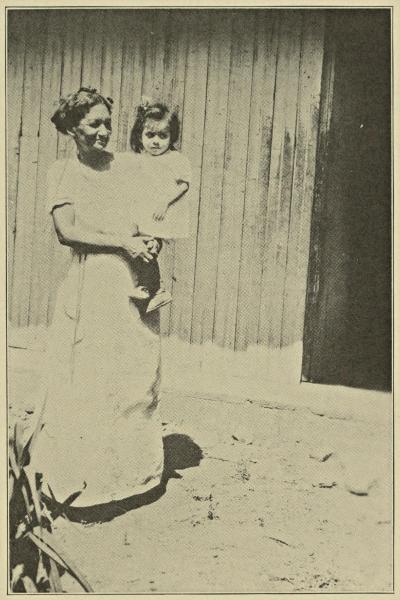
Mother with child that was raised up from death
We were having such a blessed time that we forgot about living in the slums, and about the saloons on either side of us, although at first we could not sleep for the noise from them. Soon we discovered they had moved the saloon which was so close to our bedroom. When I saw the proprietor come into the meetings, with others who came for prayer, I asked him if he had moved. He answered he had, as he did not feel good to have a bar so close to where we prayed so much. Besides, he said, he had no customers left, as they all came to hear us. Hallelujah! Jesus did move in a mighty way.
On the other side was the biggest house of ill-fame in the city. Men and women gathered there by dozens, some of them perfectly nude, dancing and drinking at all hours of the night. It was so awful we felt that hell had been uncapped in that place. But here came the “madame” to us, asking for prayer, saying she was sick, and she knew she was living a bad life. After her came many others. We prayed with each one and gave them each a Bible, until there were some mighty changes wrought in that section of the city.
One Dark Night
when the rain was falling in torrents, we were sitting around our feeble candle-light, reading our Bibles. We heard a knock on the door.[146] It was late, and we had been warned by both missionaries and the Christian natives, to be very careful to whom we opened our doors after night, as there were people who would as soon kill us as they would an animal, so we did not open the door immediately. The knocking continued, and we heard a man’s voice asking us in Spanish to let him in. My husband partly opened the door, and in the small opening we saw a tall, dark native. He pushed into the room, looking very much frightened. When we asked what he wanted, he asked if we were the missionaries. We told him that we were, and he told us that five years before he had found a Bible, and began reading it. He had become convinced of the truth of the Gospel and wished to talk with us. We talked and prayed with him, then asked him to come to the meetings. He said his mother was very angry because he did not go to the church any more, and he was afraid that if he were to come to our meetings the people would kill him. That was why he had come on such a dark, wet night to have a talk with the missionaries. We were reminded of the ruler in Israel who interviewed Jesus in the night.
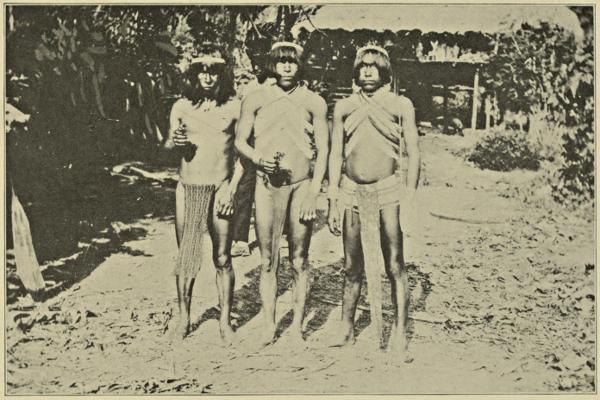
Waiting for the Gospel
He came to the house every night for two weeks. When we opened our class in English he attended. We always had a lesson from the Bible, and the scholars had to learn scripture verses. One day this man came out boldly and said, “I am coming to the meetings.” By this time we had several of the leading citizens of the[149] city attending our meetings. This young man has since been called to preach the Gospel to his people. Pray for him. The following is a copy of a note he wrote us when we left Leon.
“I am returning your book. I thank you so much for it. It has been a great blessing to me. Please pray for me, as I feel a call to preach the Gospel. Send me Bibles and tracts from your land for my people.”
Others came to the class, being anxious to learn English. The judge of the city, doctors, lawyers, and many others heard the Gospel preached. To one young man who came to the class we gave a Bible in English, and one day he came to ask us some questions. The priests had told the natives we were nice people but were teaching error, for we taught people to read the Bible and the Bible was a very bad book, and they must not read it. But this precious boy was convicted of sin, and was seeking God. We asked him to pray the Lord to forgive his sins, and then to believe that God did it. He asked for a prayer-book, so he could pray. We told him we never used prayer-books; we simply asked God to forgive us and save us from our sins. He was sweetly saved and went away to bring a cousin to the meetings. This cousin was also saved. These two were among our brightest pupils. They could read and speak English quite well in a few months.
One morning, very early, before we were up, there came a knock on our door and a little brown-faced Indian girl appeared. She was[150] about thirteen years old, and very pretty. She asked us to take her as a servant. She had nowhere to go, and had been sleeping in the market. As I looked at that dear little brown face and heard her story I looked up to my Heavenly Father and breathed a prayer that He would remember the thousands who, like her, had no home and were perishing. We told her we would take her, and I wish my readers might have seen that dear little face light up with joy because she would have a home with the missionaries. She was a very bright girl, and very quick to learn. Soon she could play the organ and sing the Gospel hymns. How she did love to go to the meetings and to read her Bible!
Carl’s Ball and Bat
Carl had a ball and a bat which had been brought from the homeland, and in the daytime he would go out into the small park near the house, gather all the boys from the streets, and play ball with them. They had never seen a ball or a bat before, and it was all very wonderful to them. Carl’s face would become very red from the heat, and the children thought it queer to see a red-faced boy with such white hair, and such peculiar things as the ball and bat. He would play with them until lunch-time, then they would come home with him, and he would get his Bible, read from it, and tell them of Jesus, and numbers of them were brought to God in this way.
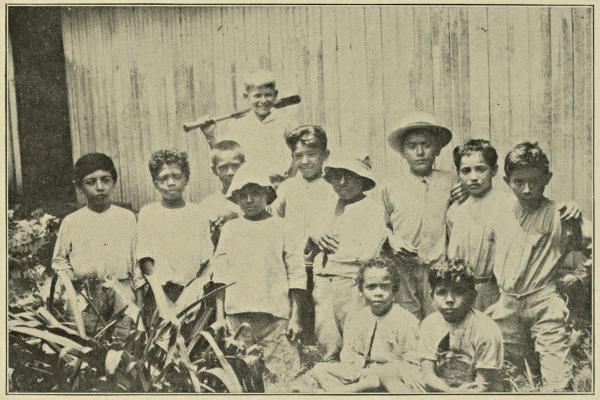
Carl, with his boys
Many boys and girls came to us asking for a school and a home, but I am sorry to say that we could not possibly take them in, our house and means would not permit. But we are asking God to stir up the people in the homeland to give till there shall be a home and school opened in this dark city of Leon where these precious jewels may be gathered in and taught the Bible, and the way to God.
We were having precious meetings, and one day a man came saying he had walked a long distance to find the missionaries, to get them to come to his home and teach the Gospel. Husband and I went with him, going as far as possible on the little railroad, then walking the rest of the way. When we arrived we felt as if every drop of our blood were boiling, we were so hot, walking so far under the tropical sun. We found the family gathered to hear the Word of God, and thought of Peter going to the house of Cornelius.
The Lord touched these dear hearts with His love in a mighty way. They wept, and cried to Him to save them. Even the little children were hungry to seek the Lord. Far away from all Christians, in a dark land, filled with idols, where the powers of darkness fill the very air,[154] were those precious souls, just waiting for someone to come and tell them of a Savior’s love. There are many thousands just like them. Dear reader, what will you do to get the gospel to them? Ask the Lord to show you what He would have you do.
I shall never forget the scene when we started to leave these people. They clung to us, begging us not to leave them. But there were our own dear children at Leon, in a foreign land, far away from all loved ones, and with no one to protect them, and the shadows of night were beginning to fall. We had to pull ourselves away from those pleading, soul-hungry people, and say good-bye. We promised to come back when we could, telling them we must go back to our little ones, and the work in Leon. The father and mother had seven bright-faced boys, and asked us if we would take them into our school, and we told them we would if we could but we were not able for lack of means.
Returning it seemed as if the slow train would never get to Leon. We were tired, and our feet were blistered from the long walk in the terrible heat. But as we looked to the Lord to refresh our bodies and heal our sore feet, the Holy Spirit came sweeping through our beings, so refreshing us that we hardly knew we had gone through such an ordeal.
In a few days there came a call to another home far away in the mountains, where the people were begging that the Gospel be brought[155] to them. I took a native woman with me and we traveled on the train as far as we could go. We purposed going to the home of some native Christians who lived in that town, and who had been in the meetings at Leon, where we thought to rest until the sun went down, as the other trip had taught me not to walk far under the hot sun. As we passed down the street I heard the people calling out in Spanish, “Hay una Evangelista!” (There is a missionary!) But I thought nothing of it, knowing they were not accustomed to seeing foreigners walking through their streets.
Arriving at the house of the Christians I was told the people would not allow missionaries to come to that town. Some months before, one of their young men had been converted. When he came back and told it, men, women, and children, with the priests as leaders, gathered, and cut him to pieces in the street near the house where we then were.
The dear native Christians were looking for the people to come at any moment and kill them. They declared that we all would be killed that day. I began praying to find out if I had missed the Lord’s will by coming there, but the Lord spoke to my heart, saying all would be well and not to fear what the people might do. So we gathered inside and prayed to God for protection, and to convict the people of their awful crimes. When we arose from prayer a large crowd was gathered outside, watching us.[156] The house was made of small poles stuck in the ground, with large cracks all around, so we could easily see and be seen.
We planned to leave the house at sunset, to walk out to the farm where we were going to preach the Gospel. I told the dear ones not to fear, but to trust God. However, they were greatly frightened and said the mob would certainly kill me when I went out. But I knew I had been sent there by the Lord, and all would be well.
I went out and spoke to the crowd, and then started down the street, leading to the country. When I looked around only my woman was with me. She told me the others had gone another way, hoping to miss the crowd, which I saw was following us. I saw some women give a boy a machette, and tell him to cut me with it. He came running toward me, talking in Spanish as fast as he could, and swearing at me. I went right ahead. He kept at my side, swearing. The mob followed us. We walked on until we came to where the road left the town, and turned into the country. I felt the power of God coming upon me in a way I had never felt before.
The veins of my neck swelled, and my body began to shake. Then I turned toward the mob and began speaking to them in tongues. They turned and ran, until not one was to be seen. A little disappointed feeling came into my heart. I said, “Jesus, I wanted to die a martyr for you here in this dark land, but now the mob is gone.”[157] The power still filled my being, until I could do nothing but worship God. The native Christians came up. They said they had seen the people run, and heard them exclaim that fire fell from Heaven and burned them, until they could endure it no longer, and they had to run. I did not see the fire, but felt it burning in my soul in a mighty way.
At The Farm
I preached and sang until midnight, and still the people begged me to tell them more “good news” as they called it. Truly it was good news of great joy to those poor people who had so long been under the heavy yoke of the enemy. There was a family of fifteen, also several hired men, besides about twelve travelers who had stopped for the night. They had only one room. When I told them I could not preach any more that night, but must have some rest for my body, and a place where I could lie down, they all went into the room—family, travelers, hired men, some thirty people in all. They took two young calves and three small deer with them, also several hens with their little chicks.
I decided not to sleep with all those people and animals in that room, with no ventilation—as the adobe houses are built without any windows. I told them to fix me a cot outside in the corridor. They said wild animals came at night, and I must not sleep outside. But I decided I would almost prefer being eaten by wild animals to being smothered. As I insisted, they[158] put a cot for me outside, and I did not awaken to see whether any wild animals came. If any came, they did not molest me.
Arising next morning I ate my breakfast off of banana leaves, then gathered the family for prayer. How the power of God did fall and fill every hungry heart! After prayer I told them I must leave them, and return home. We gathered our blankets together, and climbed into the ox cart which had been brought to carry us to the railroad station. I was too tall for the cowhide covering, which was intended to protect us from the sun, so I sat in the back and let my feet hang down over the end, and so rode to town. We sang and talked all the way, about the love of Jesus. Several times we stopped at houses by the roadside and preached to the people, giving them tracts and Bibles.
A large crowd was at the station waiting for the train. I went to the platform and spoke to the crowd. They asked me to give them Bibles and tracts. Some of them were members of the mob which the night before had been ready to kill us for coming into their town to preach the Gospel.
We arrived at Leon very tired and needing rest. But there were so many to be ministered unto and the needs were so great that I went right into the meetings, where God blessed my soul and rested my body.
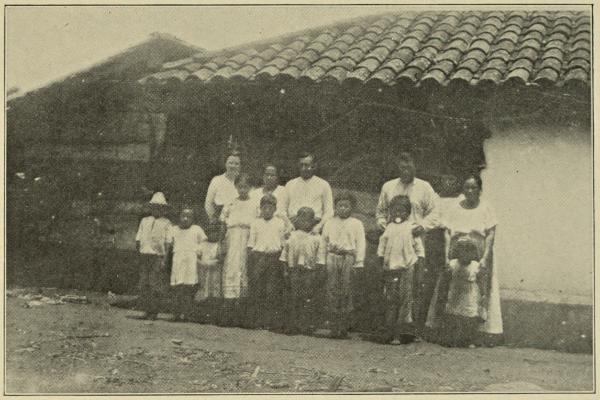
Where I preached until midnight, and the entire family was brought to the Lord.
The Lord Rolled the Sea Away
One day a young man who had been in the United States, came to see us. He spoke English well, also had been in different churches and had some knowledge of the Gospel. He came many times to read and pray with us. One day he asked if we would not go to the beach for a day’s outing. We felt we could not spare the time, and it would be too much of a luxury for us. But as he insisted on bringing his machine and taking us, we consented to go and prepared a little lunch. Before going we asked if we might preach to the people on the road. He consented, so we went for the day, taking Bibles and tracts with us. Many were the precious souls to whom we spoke about the Lord Jesus, giving them the little printed messengers. Our hearts were moved with compassion as we saw the extreme poverty of the poor people out in the country, with no one to love or help them. The roads were almost impassable and the heat was intense, but at last we saw the white-caps dashing up against the shore, and felt the cool breeze from the ocean. We stopped some distance from the water and walked down to the beach. Many Indians were there. Some could not speak Spanish, but had a sign language. We spoke to all who could understand us, and they told the rest about the Gospel, for although they spoke Spanish, they also understood the sign language.
There was a dressing place for bathers and a stand where refreshments were sold by the Indians, who could not speak Spanish. I sat down in the shade while the rest went bathing in the surf. Suddenly I was startled by the screams of my daughter, Alma. She and the young man were quite a distance out in the breakers. They were drowning, and calling for help. I saw them go under. My husband was trying to reach them, but the strong undercurrent took him down also. I prayed and called on God to save them.
Running to the Indians, I tried to tell them to run with a rope and save them. I could not make them understand, but suddenly began talking in tongues, with signs, which I afterwards learned was their language. They told the young man that I had implored them to help save my daughter, husband and himself. They ran to help Alma and the young man, but they could not be seen. I started in that direction calling on the Lord to save them. The sea rolled up in a great heap, and there they were on the sand. How it all happened I cannot tell. But I know the Lord rolled the sea away, and they were saved. They were filled with water and Alma was sick. But the Lord soon delivered her. The young man knew the Lord had saved them from death. He was an expert swimmer, but could not swim in that strong undercurrent, which had drawn them so far out before they realized the danger.
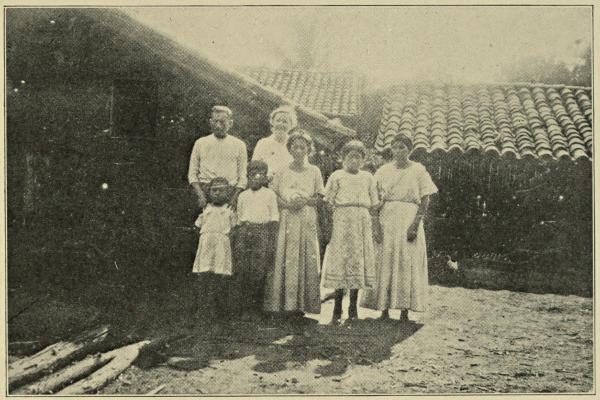
Where the entire family was brought to Jesus, and the mother’s hand was healed of blood poisoning. Note the hand wrapped in a large piece of cloth.
How we did praise God for His wonderful deliverance! It was a mighty miracle, which convinced the Indians that God had delivered, for they saw the waters rolled up in a heap. It made them believe. The news of the wonderful miracle God had performed for the missionaries soon spread about the city. It was published in the papers, and many who had not come before, came to see us and were convinced of the Gospel. Many people came from all parts of the Republic to hear the Gospel, and to ask for Bibles.
The dear saints in the homeland sent us Bibles, Testaments and tracts, and the Word of God went forth. We cannot tell how many precious souls were reached by the bread cast on the waters, but we shall know when we reach the beautiful land beyond, and see their dear faces shining with heavenly glory. We are told to sow beside all waters, and are promised that “he that goeth forth and weepeth, bearing precious seed, shall doubtless come again with rejoicing, bringing his sheaves with him.” Psalm 126:6.
Many were the nights and times we went forth weeping over the sheep that were out of the fold, lost among the idols, vice and sin of every kind. It was almost more than we could bear when so many of the people came to us, and we were unable to take them all in and help them. We could only weep and cry to the Lord to help us to reach them, and to stir up the saints at home to give all they possibly could to aid in[166] helping them. For this purpose we are sending forth this book, that funds may be raised to send Bibles and tracts to these people.
It was at this time, when many were pressing upon us for help and our means were so limited that God told us to return to the homeland and tell the church of the great need of sending more Bibles, tracts and missionaries to these destitute fields. As we looked to the Lord and told Him we did not have the money to get back home, He spoke and told us we were to pack up and go to the port, and He would send the money for us there for our fare. So we began making ready.
Another missionary and his wife came by, going home on furlough. They were going via Guatemala, believing they could save quite a sum of money by going that way. But the Lord had told us to go via Panama. We packed our trunks and made ready. But oh, how we did hate to tell our dear people we were leaving them, for we loved them so, and they loved and clung to us. We knew they would feel so badly to have us leave them.
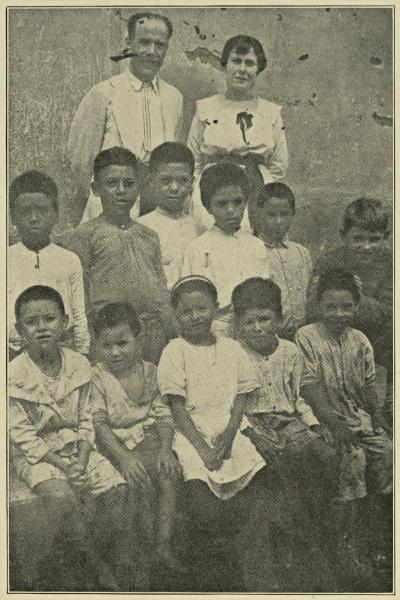
Where Carl attended native school to study Spanish. Neither the teacher or any of the pupils could speak a word of English, so he very soon acquired the Spanish.
When we went to the meeting that night we told them the Lord had led us to return to our homeland, to put the great needs of their country before the people. They cried, both men and women, and pressed upon us until we thought we could never get ready to start. I had to put our suit-cases in a room and lock the doors so I could finish packing, for the house was[169] full of precious souls begging to hear more of the Gospel, and telling us how much they loved us, and what a great blessing we had been to them. Our hearts were breaking over the people, for they were as sheep without a shepherd. May God bless and keep them true to Him.
We were packed and ready to go to the train when there came a big procession of people marching into the house. Some of them we had not met before, and some we had seen on the streets and in the markets, when we were preaching and giving out tracts. Many of them had come to our meetings, had heard and accepted the Gospel, and had been filled with the blessed Holy Spirit. They brought many presents, among them a nice leather bill-book for my husband, a manicuring set for Alma, pretty fans for me, and boxes of candy for Carl. Many useful presents they brought, some of which had cost much money, for everything is much more expensive there than in our country. Even rich people had come and brought presents to show their appreciation of our missionary work among them.
When the train pulled in, and we were about to go on board, several doctors and lawyers and the judge of the city came, saying they were going to the port with us to stay until our ship sailed, and there was the crowd standing outside waving their hands and saying, “Good-bye, don’t forget to pray for us, and send us Bibles.” Oh[170] that scene! We shall never forget it. As the train started the people hung on to the side, waving their hands, and calling “Good-bye, our good missionaries; we love you so much.”
We had many opportunities to witness for Jesus and to give out literature on the way to the port. The people were so hungry they would run and beg for more tracts.
When we arrived at the port station we were taken to a hotel by one of the men who had gone with us, and there a fine dinner was given us in a special dining room, and we had a nice time.
We found we must appear before the American consul twice a day for several days before sailing, as we had come from a yellow fever infected region. We began to go that morning, for the ship bound for Panama would come in seven days.
We made ready to leave on that boat, but there was no money for the fare. As I prayed in my room one morning the Lord said, “Go and ask for your mail.” I thought, “I don’t believe the mail is opened here, but on arriving in the port is immediately sent to the different parts of the country.” But as I prayed again the Lord spoke once more, “Go and ask for your mail.” I knew it was the voice of the Lord, for He had wonderfully spoken to us and led us all the way, so I went. On asking for the mail I was told that no mail was coming for two weeks, and when it did come it would not be opened there but would be sent out to the different parts of the republic.
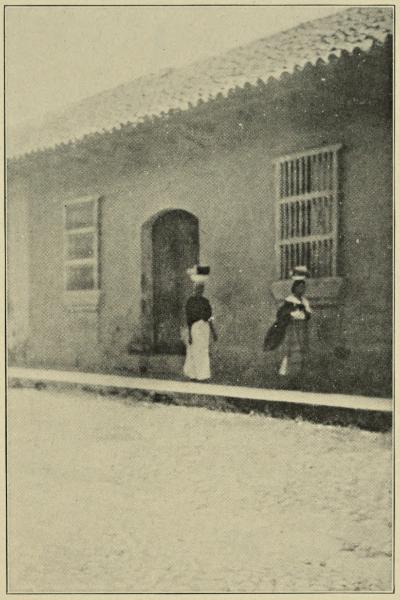
Women coming from the market place
I returned to my room, wondering. I believed the Lord had sent me for our mail, but why had the postal officials said it could not be obtained there? Besides, there was no mail boat coming until after the other boat had sailed. But as I prayed I heard the voice of the Lord telling me to go again and ask for my mail. I waited until the next morning, then went again. Once more the postmaster told me the same thing, that it would be impossible for me to get my mail there when it did come. I must admit that I felt at a loss to know what to do, or what it all meant. But I couldn’t doubt the voice of the Lord. I waited another day, and prayed until I was sure the Lord was speaking to me. Though I couldn’t see how it all could work out, yet I knew that He knew, and had spoken.
I went again to the postmaster and explained to him that we were sailing on the ship which was then in the harbor, and which was to leave in three days, but again he told me the same thing; there would be no mail boat in for two weeks, and it would be impossible to receive my mail before that time. I returned to my room and, falling upon my face, I cried to the Lord for help, for this seemed more than I could bear, for the enemy was taunting me, saying that the Lord was not speaking to me, that we had been deceived, that the Lord had not even told us to come to the port, and that our fare would certainly not be provided. Nevertheless, the voice of the Lord came again to me, saying, “Ask for your mail tomorrow morning.”
When we arose the next morning we saw another ship at anchor in the port. It had come in during the night. My husband strolled down to the dock, and was informed that this was the mail boat from Panama, also that our ship was not to sail until the following day, because the cargo was not yet unloaded. When he returned with the welcome news I began to pray again about the mail, feeling certain there was something for us on that ship. Then I went again to see the postmaster, this time taking a Testament to give him. This seemed the wrong thing to do, for he was a fanatical church man, and the Gospel was not allowed to be preached in that port. But we had gone unmolested all over the place, distributing tracts, and preaching to the people, and the dear natives had begged for Bibles and the little papers (tracts).
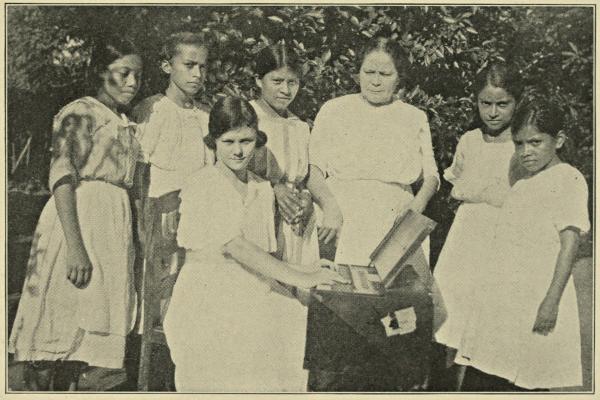
Alma with her music class in Leon
Walking up to the office window, I told the man the Lord had spoken to me, telling me there was mail there for me, which had come in on that ship. He came to the window, began talking about the Lord, and asked me how I knew the Lord had said there was mail there for us. I answered that we had come to port in order to sail on the ship then in harbor, that we did not have our fare, but the Lord had told us the fare would be provided after we reached the port. I was sure there was mail for us there, and would he please give it to me? Handing him the Testament, I told him to read it, and learn about the wonderful Savior who could come into our hearts and talk to us, and lead us in such straight[177] paths. He began to weep, and told me he had never before seen a Bible, had hated and persecuted the missionaries, had hated me when I came inquiring for mail, and had not even believed in God before; but my coming so many times, saying the Lord had told me there was mail coming for me, in spite of my knowing that the mail ship was not due for two weeks, then the arrival of the mail ship before time, and the postponed sailing of the other vessel upon which I said we were to sail, had convinced him that God was actually speaking to me, and he promised to try to get our mail. However, there were thousands of letters, and he was rather doubtful if he could find our mail in the midst of so much other, but promised that if I would return in the afternoon he would do his best for me. In the afternoon, I returned for the mail, which I was sure would be there. The man came hurrying to me, and handed me two registered letters, saying they were on the top of the pile of mail in the first bag he opened. Surely God had spoken to me, he said, and he knew now there was a God, and he was going to serve Him, so as to have Him speak to him, too. And very earnestly he promised to read the Testament, also he asked for a Bible for his wife, and tracts for his friends.
When I opened the two letters there, lacking twenty-five dollars, was the amount for our fare. We sailed the following morning. Later I went into my stateroom to find out the exact amount of money we had, to make sure how much was[178] lacking for the entire trip to the homeland. Sure enough, there was exactly twenty-five dollars lacking. Again I looked to the dear Lord for help to believe for the needed amount, and again He spoke, telling me to open my Bible. I did so, and my eyes fell upon this scripture:
“And the Lord, He it is that doth go before thee; He will be with thee; He will not fail thee, neither forsake thee; fear not, neither be dismayed.”—Deut. 31:8
Looking at the little scripture calendar hanging on the wall I saw in the space for the day on which we would land in Panama the identical verse I had just read. Strengthened and encouraged by this, I felt that Jesus would make it all right, and that we were simply to trust and obey.
Upon arriving in Panama we were taken to the American Bible House, where we were treated with the greatest kindness. Dear Mr. Duffey and his wife gave us much valuable information about the whole of Central America, as they were in touch with every mission station, and had themselves been missionaries there for many years.
We had to wait three days for the ship to New Orleans, and we sweetly rested in the Lord and trusted Him to supply that twenty-five dollars.
One day we met a young Mexican on the street, whom we had known in Nicaragua. He[179] was a traveling salesman from St. Louis, Mo. We had given him a Bible and talked to him about giving his heart to the Lord, and he had been very much interested in our work in Nicaragua. We invited him to visit us at the Bible House, and in the evening he came. We read the Word of God and had prayer, and he told us of his having persecuted the missionaries in Mexico. He had never seen a Bible before he met us, but in the United States he had learned that missionaries did a good work among the people, so he no longer hated them. He said he was glad to have met us and heard us preach the Gospel. “In return for this Bible which you have given me,” he said, “and the way in which you have talked to me, I feel I should do something for you, and the Lord,” and he passed twenty-five dollars across the table to me. Praise the Lord! there was the rest of our fare home. Surely God does temper the wind to the shorn lamb, and take care of His little ones, leading them in and out where they can find pasture.
We sailed the next day. Many were the precious souls reached by us with the Gospel while we were in Panama; also on land and on sea after we left there. Shall we not praise God forever for all His goodness to us, and for the privilege of being called to preach to the nations of the earth?
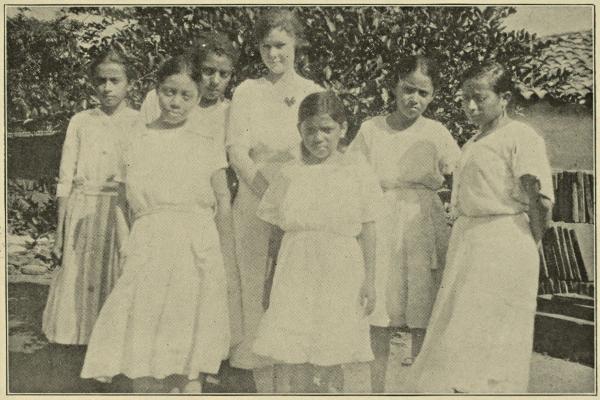
Alma with her English class of native girls
We sailed on the Steamship San Juan. After placing our things in the stateroom we went on deck and sat down. A little South American woman came over to me and asked, “Are you a missionary?” I told her I was. “Well,” she said, “I thought you must be a missionary, for no one else would be away down here so far away from their homeland.”
She had been in the States studying to be a nurse, and had been saved through a Salvation Army meeting on the street. She took my arm and said, “Come right over here. There is a poor blind man from Salvador, and he badly needs help.”
We thanked God, for here was another chance to cast our bread upon the waters, another hungry soul reaching out for the truth.
We took some tracts and Testaments and went over to the man. He said he had heard a traveling missionary preach the Gospel several years ago in his own country, and had longed to know more about it; now here we were to tell him. So he praised the Lord, and we wept and told him Jesus loves us so much that He never fails to answer the prayer of an honest soul.
We gave him a Testament and some tracts on Salvation and Divine Healing and the dear little woman read them to him. Day after day he asked for more to be read to him. The woman[184] asked if we could not give her some to take home to Ecuador to her people.
There was only one man on the ship who did not take tracts and read them and ask for more. This man said he had not read the Bible since he was a child. Now he was too old. As we looked at him and saw the hardness in his face, a great pity came into our hearts, and we asked the Lord to have mercy on him and save him.
We arrived in one port in Costa Rica on September 15th, Spain’s Independence Day. The whole country was celebrating. Our ship would have to wait here several days, perhaps a week, the captain said, because all the people got drunk on that day, and it would take several days for them to sober up. We arrived at six in the morning. The noise from the cannon and other things was terrible. We knew about how much time we had to make connections in Panama, and that we could not stay in this port over one day without missing connections. So we prayed that God would make these people unload the ship that day so that we might go on.
At twelve, when we were having lunch, our ship was moving out to sea. The men had come with their lighters and unloaded several tons of the cargo, and we were on our way. The dear old man who would not read the tract, ate at our table. He said he had lived there and in Panama for fifty years, and that was the first time he ever knew them to do such a thing. He knew it was because we prayed. So God was good not to leave him without a witness.
A man and his wife were going to South America. They took tracts and Testaments along which we gave them, and said they were glad to have the light on the Second Coming of the Lord, and on Divine Healing.
There were people on board who were going to Japan, China, India, England and the United States. All took with them the Word of God which we had cast upon the waters. Two young men on their way to school in New York, took along Testaments to read. They said they no longer believed in the Church of Rome, and wanted to read the Bible.
Another boy on his way to South America came to talk with us about the Bible. He said he wanted to read the Bible but had never had the opportunity. So he sat on deck and read it. How he did rejoice to know the truth! He told us how he had gone to the different temples of the idols and saints seeking peace, but had come away from them all without receiving any help. But now he knew the truth, and wanted to carry the good news to his people who were still in the darkness. He said, “Why don’t more missionaries come and tell us the truth? Won’t you go back to your homeland and tell them of our needs and the darkness we are in?”
Stewardesses, waitresses, captains and officers all heard the story of the Gospel, through the bread we cast upon the waters. One officer said he was glad that someone thought of the men at sea. They were always going and had no time to attend church and hear the Gospel. He had[186] had Christian parents, but they were dead. His heart was touched and with tears running down his cheeks he said, “May God bless you for giving me this Testament. I shall read it, and pray every day, as I want to meet my dear mother in Heaven.” He had been at sea twelve years, and that was the first time anyone had said a word to him about salvation.
The doctor on the ship was so interested he would leave his office for hours and come and talk with us. He had been on that line many years and he had been shocked to see the condition in the Latin-American countries, and the church at home seemed to be doing nothing. He took tracts and papers and talked with us about prophecy. He said he knew the Lord was coming soon. We invited him to meetings with us at Colon. He came to the Bible House and to the meetings and said he was going to a Pentecostal meeting when he returned to the States.
While in Panama we visited the Sea Wall M. E. Church, where there is a work among the natives. But all who come to the school have to pay. That leaves the poor population wholly untouched by the Gospel. We looked over the field and found it a great white harvest field, where laborers are badly needed. In all these parts the people are hungry for the Gospel.
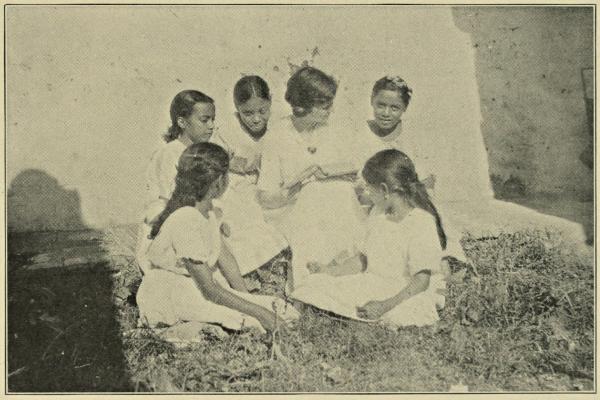
Alma reading a Bible story to her girls
There is a little union church in Colon in which a few people are praying for a revival. It is a wonderful opportunity for a band of workers to go and hold evangelistic meetings.[189] There are many English-speaking people in these parts, but Pentecost has not been preached. We believe God will raise up workers and send them to this place. Besides the people who live here, there are hundreds of ships coming and going to all parts of the world. Many souls could be reached.
Finding a ship that was to sail for New Orleans we went aboard and set forth, carrying with us many more tracts and Testaments so that we might cast bread upon the waters among other people.
Soon after leaving the port I noticed a man on board whom we had met in another place. He was a gambler, who traveled and gambled on ships all the time. We had spoken to him of the Bible and about the Lord, but he had said he did not think anyone ought to talk about the Bible and religion, as such talk would make people lose their minds. We were only getting people stirred up, and that wasn’t good. I heard him tell the captain we were missionaries, and that wherever we went we talked about God and the Bible, but he hoped we would not be allowed to do so on this trip.
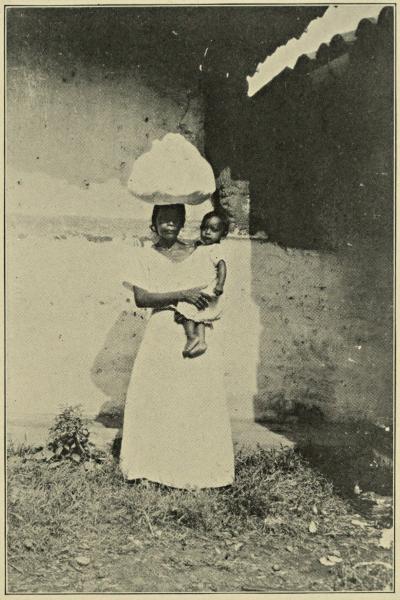
An Indian woman who came to the meeting and was saved.
Some of the people looked so very aristocratic that the enemy said to me, “You had better not give out tracts and Testaments on this boat, as the people will not listen, for they will think you are a fanatic.” But I felt I must let my light shine here as well as in other places. So I went to my stateroom to pray. I opened my Bible to read and saw in it a little tract, containing these words:
“Have you overcome the worldly opinions of the sect which is everywhere spoken against by taking your stand with it? What would Jesus have you do? Have you done that? If the world has nothing to say against you, Jesus will have nothing to say for you. His grace is sufficient. Ask Him.”
That was a message to my heart. I said, “Lord, I will go through this ship and give out tracts to everyone. Now, Lord, you bless every dear heart, and open to them the Gospel.”
As I passed around the deck giving out tracts, a man and his wife asked what church I belonged to. I told them I belonged to
“The Church of the First Born.”
Then I told them about the Pentecostal people, and how we had received the Baptism of the Holy Spirit, as the people did on the day of Pentecost, and told them that God was pouring out His Spirit on the earth, and that Jesus was coming again soon. They were Seventh-Day Adventist missionaries from Colombia, South America, coming home on furlough. They had been on the field four years, but had only been selling their literature. Nobody had been saved, but they thought that when, they went back again they would be able to do something, as the people would have an understanding of their religion and the keeping of the Sabbath Day. We could see their lives were empty, and that they knew nothing about worshiping God in Spirit and in truth.
We had many talks together about the law of Moses and the ten commandments. We showed them we are dead to the law through the body of Christ, and that we should serve in newness of Spirit and not in the oldness of the letter. Oh, how these dear hearts did respond to the Word of God! They had been reading the many different books of their denomination, but did not have a Bible. We asked them to read the Word of God that would bring Spirit and Life into their lives and we gave them a nice Bible. As we separated in New Orleans, they took my hand and said, “Thank God for sending you on this ship. We felt empty and dry, and now we know what is the trouble. We shall read and pray until we are filled with the blessed Holy Spirit, and when we return to our mission-field we can preach the Gospel to the people.”
A family coming from South America took tracts and Testaments and called for more. They said they were Lutherans, had been raised in that church, felt a lack in their lives, and wanted to have the power and glory of God in their souls. They believed that Jesus was coming soon.
Every time we went into the parlor and sat down we had a congregation, for the poor people were so hungry they would come and ask us to tell them more about this wonderful way.
A great hurricane was sweeping the Gulf. A wireless message had been received that the storm was terrible, and warning us to prepare[195] for it before leaving the port. The blackness was awful on the waters as we went out. As we moved slowly out of the inner harbor, some battleships were having target practice at sea. Two submarines partly submerged, were slowly moving along to keep ships from coming too close to where the sailors were shooting.
The Lord said to me, “Just as those submarines are placed here to protect the ships from the shooting, so I will place My angels around this ship and the storm shall not molest you.”
“Only believe and rest in Me.”
The passengers were frightened, and the captain gave orders to have the storm doors and windows put in, and the ship made ready to meet the terrible hurricane. But on we sailed, and the storm moved on in front of us, all the way to New Orleans. Only once did we get into it a little for a few minutes. The rain came down in floods, the wind blew with great force, thick darkness settled down over the ship, and we were tossed by the great waves that arose. Many became sea-sick and ran to their staterooms for life-preservers. The captain gave orders to have the life boats in readiness.
As we passed into our staterooms, not to get the little cork-and-canvas life preservers that were lying there, but to get in touch with the One Great Life-Preserver, who said He would give His angels charge over us, there came into our[196] hearts a sweet rest and peace. After prayer we arose and went on deck. As I passed through the door I met the captain, who said, “I have been looking for you and your husband, that you might pray for our ship to be saved, as there is no other hope.” He himself lifted up his hand and asked God to drive back the storm. Just then the blackness swept off the decks, the ship straightened up, and the sun smiled down upon us. Surely God giveth His angels charge over us, that we should not dash our feet against a stone.
From that time on we were sailing just behind the big black hurricane. A ship that had been following us was caught in the storm, and for three days and nights they were lost and had no hope of being saved. A young man from this ship rode on the train with us from New Orleans to St. Louis. He told us of the terrible things they suffered. How they all had life-preservers on many times, and were ready to get into the life-boats, as they thought the ship would go down.
On our ship every passenger, officer and member of the crew took tracts and Testaments and read them. The captain told us he was glad to have someone on the ship who knew how to pray. On the previous trip he brought some women from Colon who were dope fiends. The whole boat was in a terrible uproar all the[197] way, and he feared God would let them all go down for such wickedness. He himself knew something of the power of God. He took a Bible and tracts and asked for some of our books for the ship’s library. Shall we not give these men some good books to read at sea?
The gambler, whom I heard say we were always talking about the Lord, came to me and said, “I want to get some papers and a Bible. I have always been a wicked man, but since I have been on this boat I have made up my mind to give my heart to God and live different.” He said he had a Christian mother who taught him to kneel at her knee and say his evening prayer, and he wanted to meet her in Heaven, for he knew she was there.
One of the professors from the Northwestern University was on board. He had been traveling through all the Latin-American countries, gathering information for the new history he was writing. He came to talk with us, saying he was interested in mission work. We gave him all the information we could about the different parts of the country we had visited. He said, “I know you people have something I haven’t. What is it?” He was a member of the Presbyterian church, and had been since he was a very young child. His father was a minister, so he had always been brought up in the church.
As we read the Bible to him and prayed with him, telling him of the great outpouring of the Spirit of God in these last days, and the soon[198] coming of Jesus, he wept like a child, and said he was ready for all God had for him. When he returned to Chicago he would go to a Pentecostal mission, as he knew this was the truth of God. He was a very sweet spirited man, open to the Spirit of the Lord. He took with him many tracts on the Baptism of the Spirit and the Second Coming of Jesus.
A young man, on his way to school in the States, asked for a Bible, saying he had never seen one, but had a great desire to read one. Since hearing us talk so much about it, he thought it must be a wonderful Book. He took a Bible to school with him, also tracts and papers. He was a native of Costa Rica.
As we were leaving the ship at New Orleans people came for more Testaments and tracts to carry away with them. One brother and sister, very wealthy people, traveling for pleasure, took many of the little messengers, the sister saying that when she reached her home in Oklahoma she was going to prepare herself for missionary work. She was tired of the life she had been living, and having seen the awful need of the Central American people, she could never be happy again until she went to help them.
In New Orleans we gave out hundreds of tracts and found many hungry souls. I visited some of the missions there, in search of Pentecostal people, but they told us there were none there. Such a needy city! May the God of Heaven stir our hearts until we are[199] awakened and go forth into every city of the Union with this message of the hour, and the people are reached and the Holy Spirit is poured out upon the earth.
On board the train for St. Louis, we found many hungry hearts ready for the truth, having never heard it before. In the Union Station, St. Louis, we found others who were hungry. They took the tracts and went away pleased to have them. Even in our own city we found people who were eager to hear the Word of God. Many were the precious souls reached by the Bread upon the waters, which we freely cast forth.
We traveled from Granite City, Illinois, to Los Angeles, California, giving out tracts and Testaments. From Los Angeles we sailed to Central America and gave out the Word in every port we came to in Mexico, Central America and Panama. From Panama to New Orleans and Granite City we distributed the Word to thousands. We look back over our journey and see a long white line of Bread that was cast upon the waters, reaching our home in Granite City, where also God is working.
There is a land not far away. It lies on our own continent. It is a land of tropical beauty, where cocoanut palms wave their tall green branches in the breeze, and where flowers bloom the year around. The banana, pineapple, orange, and many other tropical trees and plants yield their fruit in rich abundance. The chatter of innumerable parrots and the sweet songs of many birds are heard from the great tall trees of the forests. Scantily-clad brown-faced boys and girls run about. Seeing it, one is made to say, “What a beautiful country!”
But, ah! As one advances inland, leaving the pretty harbor of Corinto, on the Pacific coast, the signs of the enemy’s work are on man and beast.
There is desolation everywhere. The poor people are too weak to withstand the strong rival with whom they have had to battle so long. Homes are broken up. Mothers with their little children are crying for help. Their cries are heard on every side. Powers of darkness sweep over the whole country.
The poor are driven like animals to the plantations to work for a few cents a day, not enough to sustain life. They are paid in advance for the season’s work. The wage is so small the family soon spend it all. Then they are arrested and made to work for what they have already[201] received. Even mothers are put into the coffee and banana fields to work in the hot sun. On the poor tired women go with their babies strapped to their backs all day long, with nothing to eat but a tortilla (a corn cake baked without seasoning of any kind).
In the evening the poor tired people make their way to their little huts, which are made of a few sticks driven into the ground and covered with straw or palm leaves. There they grind corn for tortillas, the children carrying water in little buckets made of gourds that grow on trees, or in a jar made of clay. Their homes are as dirty as pig-pens, for the animals live in the house with the family.
As you travel through the country you find the very poor, who live in the mountains, far away from the cities, often whole families, without clothes. If they wear anything at all, it will be a piece of cloth woven from grass pinned around their bodies with a thorn, for they never saw a pin or button. Many boys and girls fourteen or fifteen years old have never worn clothes.
Both in the cities and in the country women are beasts of burden, for the women or the donkeys furnish the transportation, the men do not work much. The women work in the markets and little stores, and carry great loads of sugar, fruit, water, etc., on their heads in the hot sun. The streets are full of children that never were in school. They grow up to be lazy, fight with each other, and steal. When[202] you have one around who is not saved you have to keep everything under lock and key.
More than two-thirds of the population are of illegitimate birth. Men and women live together and raise families, yet are never married. One of the difficult things the missionary has to do is see that they marry and live clean lives.
The priests charge so much money to perform the ceremony that the poor cannot pay it, so they live on year after year in this way; but they have to pay so much to the priests every year to get them to forgive their sin of adultery, in that way the Church of Rome gets more from them than they would to marry them. The priests prey upon the superstitions of the people to extract money from them at all points. The natives’ religion is a mere form of outward exercises.
For over 400 years the whole of Mexico, Central and South America, as well as the West Indies, have been under the heavy yoke of Romanism. The Spaniards came into the country and, driving the natives at the point of the sword, baptized them into the Roman Church, and took away their language and liberty. They compelled them to carry timber and stone from inland and build temples for the Roman Church.
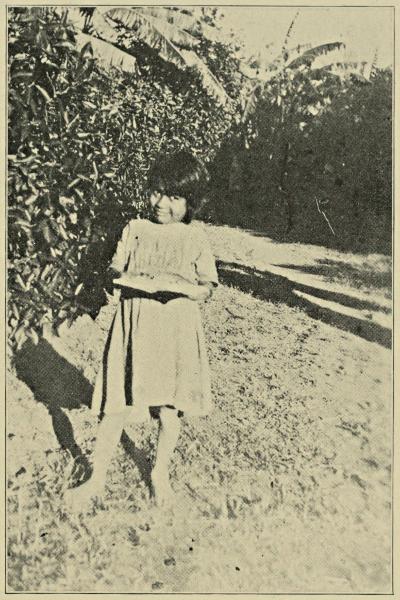
I am just a brown-faced Indian girl, but I want to learn to read God’s Word. Will you send missionaries to teach us? There are thousands just as I am.
In Leon, which is the largest city of the Republic of Nicaragua, and where we have our work, there are between seventy and eighty thousand people and forty-two temples. And when one sees those old temples almost ready to tumble down, and covered with moss and[205] grass centuries old, one feels that Rome is certainly coming to the end of herself in these countries. The people are rising up now and calling for schools, and for freedom of the press, and are crying, “Away with the Church! It has never done anything for us.” Many thousands are becoming free-thinkers.
Nicaragua is the only Republic of Central America that has Church and State united. A great fight is now on for their separation. There are over one million people in this Republic alone without the Gospel. Let us pray God to speed the day when these reforms shall be wrought and the Gospel be given the people.
Nicaragua saw her first missionary sixteen years ago. It has been the last of the Republics to receive the Gospel. The persecutions were so severe that the missionaries had to leave in a few weeks. But, thank God! some of the people accepted the glad news and have stood true through flood and flame. But there are very few missionaries there as yet, and thousands are without the knowledge of a Savior who died for them.
All these countries are being flooded with New Thought, Russellism, Christian Science, Theosophy, and Spiritualism. Many are coming into these things now, for the people are fast turning from Romanism. They are like little hungry birds with wide-open mouths ready to accept any poisonous thing presented. Are we, the true followers of Jesus Christ, going to sleep on and fail to wake up to this great[206] opportunity? Let us go forth with the old-time Gospel of Pentecostal power, that will drive the enemy from the land, and give these dear people the truth.
At one place where we were having meetings the people asked us why missionaries had not come to them before. They said, “We saw the first one sixteen years ago, but he was so persecuted he had to leave us in a few weeks, and only a few heard the Gospel, and we have been in darkness for so long. Oh, if some one had only told us before the way of life!”
Many children were brought to us to be placed in school, so that they might learn to read and write, and study the Bible. But as yet we have been unable to open a school. My heart has been torn as I have seen the little children growing up in such ignorance, and especially the young girls. This country, like all other countries without the Gospel, regards the women and girls as no more than animals, and they are the prey to every horrible crime that anyone wishes to inflict upon them. The little girls are often sold into lives of shame by their parents for a few dollars. We knew one mother who sold her four young daughters. One of them found that she was to be sold so she ran away and hid in the mountains, but they hunted until they found her, then they bound her and carried her away, dripping with blood where she had been beaten with clubs and stoned with stones. The man that took her was, I am sorry to say, an American. “It is only the precious[207] Blood of Jesus that can change the human heart, that is deceitful above all things, and desperately wicked.” Jer. 17:9.
Many foreigners have come here for money, and do not care much how they get it. Some have gold mines, others have plantations, many of them are Americans. They are making every sacrifice for the gold that perisheth. Shall not we, then, who have the treasure of Heaven, break the Bread of Life to these dear hungry souls ere they perish?
There came to us early one morning a bright-faced Indian girl about thirteen years old. Her parents were dead, her sisters were living lives of shame and they had driven the poor little one out from them. She had been sleeping in the markets and parks and was crying in the street. Some one told her to come to us for we were missionaries and we would help her. She said she would be our servant and do anything, that she might have a place where she could be sheltered from the wicked men. She is only one of the many thousands that are here in this dark land crying for some one to help them. Unless we take them in they will be destroyed by sin. Many are found dead, having been killed to hide the crime of some wicked person. It is in behalf of these suffering ones that this little message is sent on its way in the Name of Jesus.
We are having blessed meetings. Many are coming out to hear the good news. Some have already received the Baptism of the Holy Spirit. A native brother that has been saved has gone[208] out to another place to preach, and the power of God is falling. Several have received the Holy Spirit, and others have been blessed in soul and healed in body.
Soon after coming into the country God gave me a vision of the blessed Latter Rain falling all over Central America. So I ask you, dear child of the Lord, to pray that the people in the homeland will be stirred up to come up to the help of the Lord against the mighty. Many missionaries have gone to China, India, Africa, and the Islands of the Sea, but few have come to this country. Let us awake and pray that the Lord will send forth laborers, and that the means will be provided for their support, and that this very needy land shall hear the blessed Gospel story. There are a few faithful soldiers of the cross laboring here, but the battle is hard and long.
Some have fallen, and their comrades have laid them away on the green hillside to await their reward at the coming of the One who said: “He that reapeth receiveth wages, and gathered fruit unto life eternal.”—John 4:36.
But there is a great door open, and the enemy is flooding in with all sorts of implements of war. There is urgent need of more soldiers and supplies. Just as Uncle Sam was able to send men and means for the great conflict in Europe, and so defeat the enemy, so our Captain, who never lost a battle, is able to send His soldiers, to defeat the enemy and drive him from the ranks and to send great showers of blessing upon the dry and thirsty land.
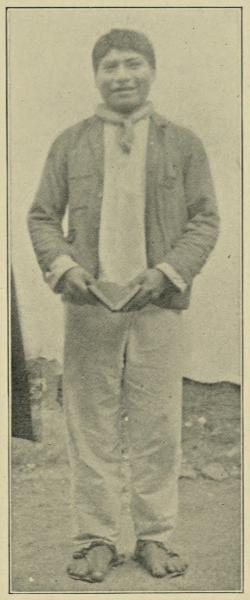
One Indian who found Jesus and loves his Bible
Just as some returned from the European battle-front to call for help from their countrymen, so we send out the cry to our brothers and sisters in Christ to let them know the great needs here, that they may join in a petition to the Throne of Grace for help.
From the time that Gil Gonzaloz de Avile reached the peaceful shores of the Chontales—Nicaragua—penetrating to the borders of the great lakes, the Indian has been made to suffer from the hands of the so-called enlightened races. When the above gentleman set his feet on Nicaraguan soil, the land contained some 3,000,000 peaceful and industrious Indians. In less than ten years 2,500,000 of them had perished in battle, were worked to death in the mines, or had starved in the mountain fastnesses.
In 1529 the Indians revolted, and after six terrible battles, the Spaniards succeeded in defeating them; the Indian chiefs were thrown to bloodhounds, who tore them to pieces. The masses were subjected to heavy tributes and severe tasks, and were driven like cattle by their cruel conquerors. Whoever resisted was ruthlessly tortured, towns that rebelled were destroyed and the people put to the sword. The Indians were reduced to the most abject slavery, their property was taken, and they were branded like cattle with hot irons. This cruel practice prevailed for years, and the miserable remnant of Indians who were still permitted to live, moistened their native soil with their bloody sweat, or dragged out a painful existence in the[213] mines or gold placers. Coffee, rubber, sugar and cocoa were not then sought as today.
In 1810, when the first movement toward freedom began to be realized, an impartial observer unhesitatingly estimated the entire aboriginal population of the country at about 90,000 souls. The real Indian is fast going out of existence. The Ladinos, a class of mixed Spanish and Indian, soon may be all that is left of the Indian.
A fear of the white man has been planted in the Indian by these things. This makes it hard for the missionary. When one visits their villages, the children and women run and hide, and sometimes the men too. Only when one is well acquainted will they show friendliness. To reach them, a missionary must live among them, show them love and kindness and prove by word and deed that they are their friends, and desire to bring them to the true light of our Savior Jesus Christ.
These poor Indians are much oppressed. A planter will make a contract with a man for himself and oftentimes his woman or wife (they are seldom married) and all his children, to pick coffee, etc., giving him money on the contract for his living. When the planter is ready this man and his family must appear and work, gathering the crop, receiving twelve to twenty cents per day. If he does not appear, soldiers are sent after him, and he is brought at the point of the bayonet with his hands tied behind him[214] and made to work until his debt is paid. The contract may be made as far as twelve months ahead, and likely the man has used up all that his contract calls for. He then seeks work elsewhere, or even contracts himself to another planter.
I know a man who has been trying for four or five years to get free from his “patron,” as the planter is called. Because he is a good worker the planter will not release him unless he pays four or five times more than he owes. The man is interested in the Gospel. We are praying God to liberate him and make him a true servant for our Lord Jesus Christ.
May God help the Church of Christ to awake to see the awful condition of these people, who are also compelled to pay their church dues by law and by force. I know a woman who was back in her church dues. They took all that she had, which was a few chickens.
Friend, will you not take these dear people on your heart in prayer and intercession? God can and does save poor Indians. We have seen His work in the lives of some. Brother, Sister, awake! Our Lord is at hand, and what is done must be done quickly. “Whatsoever He saith unto you, do it.”
There is also a remnant of Indians in remote parts of the Republic known as the Suma and Mosquito tribes. These Indians have not come under the influence of the Church of Rome. They do not speak the Spanish language. There[215] is more English than Spanish spoken among them. For more than half a century the Moravian missionaries have worked among them. They have several missions and churches scattered along the Atlantic coast, and up some of the large rivers. The Moravian Mission has translated the New Testament into the Mosquito language.
In 1831, four Indian chiefs from Idaho made their way over the Rockies and were found on the streets of St. Louis, asking, “Where is the white man’s Book of Heaven?”
General Clark befriended them, took them around the city, where they were shown everything of interest, and they were treated with the utmost kindness. Finally two of the chiefs fell ill and died, and when the remaining Indians were preparing to return to their own tribes, the general gave a feast for them. At the banquet, in a farewell address to General Clark and friends, one of the two Indians poured forth his burden of sorrow in words of pathetic eloquence, as follows:
“I came to you over the trail of many moons from the setting sun. I came with an eye partly open for my people, who sit in great darkness, but I go back with both eyes closed. How can I go back blind to my blind people? I made my way to you with strong arms, through many enemies, and through strange lands, that I might carry back to my people much knowledge, for my people sent me to get the white man’s Book of Heaven.
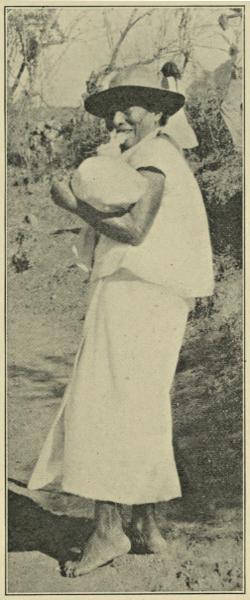
An Indian woman whose attention was attracted and picture taken without her knowledge. Indians are very superstitious and are afraid to have their pictures taken.
“You took me to see many strange things, and to places where you allow your women to dance,[219] as we do not ours, but the Book was not there, and now we are going back the long trail to our people in the dark land. You make my feet heavy with many gifts, and my moccasins will grow old carrying them, but the Book is not among them. What shall I do? Shall my people die in darkness? When I go to them, without the white man’s Book of Heaven, and tell them I could not get it, they will rise up, one by one, and go out, to return no more, for it is for that Book that they have been awaiting my return. How can I return to my people without the Book?”
It is said that the city was searched for a Bible in this man’s language, but there was none to be found, and the Indians went their way. This incident was told in a Methodist Episcopal conference, and an appeal was made for some to carry the Gospel to the Indians. Two young men just starting in the ministry were present, and they arose and said they would go. They married two lovely young women, and loaded an ox-wagon with their belongings and with Bibles translated into the language of the Indians to whom they were going. Many weeks of strenuous travel passed before they reached their destination with the white man’s Book of Heaven.
The first two white women to cross the Rockies were these two young brides, with their husbands. They spent their lives preaching the Gospel to the Indians, hundreds of whom[220] were brought to Jesus through this faithful ministry.
Shall we not learn a great lesson from this story? Shall we not, with all our modern conveniences and greater opportunities, rise up and get the message to the great masses of humanity before Jesus comes?
One time, while preaching to a large crowd of natives in Central America, I told them of the great love of God, and how He had saved us, and put His great love in our hearts which was why we were there to preach to them and tell them of that love. When I finished, an old man arose. He said he was eighty-four years old, and this was the first time he had heard the Gospel. Then he asked, “How long have you people of the United States known of this wonderful love of God?” I answered that we had always known of Jesus, that thousands knew of Him, and were serving Him, and that I had been saved about fifteen years. The old man then asked why, if we had known of this great Savior so long, we had not come sooner to tell his people about Him, for all his relatives had died, and had never heard the Gospel. He continued, “If I had known this Gospel and the wonderful love and power of God to save us from all sin, and if you had known nothing of it, I would have come to you.”
When I began to make preparations to leave their village they held on to my dress and to my arms, begging me not to leave them, with no[221] one to teach them about the Bible, and they would not let me go. Finally I had to pull myself from them and go for my train. As far down the track as I could see, those dear ones were waving and calling me to return to them. Even now I can see those beckoning hands and hear those voices calling, although I am now far away in my homeland.
What? Shall they perish without knowing of God’s great love and of His power and willingness to bless them and lift them up from the awful darkness of sin and idolatry which they are in? I wish my readers might get a peep into the land where the true God is unknown, and where there are no Bibles to guide the people into the right path, I am sure they would give, and so help others, who have been called, to go.
End of the Project Gutenberg EBook of On Mule Back Thru Central America with
the Gospel, by Mattie Crawford
*** END OF THIS PROJECT GUTENBERG EBOOK ON MULE BACK THRU CENTRAL AMERICA ***
***** This file should be named 57432-h.htm or 57432-h.zip *****
This and all associated files of various formats will be found in:
http://www.gutenberg.org/5/7/4/3/57432/
Produced by Bryan Ness and the Online Distributed
Proofreading Team at http://www.pgdp.net (This file was
produced from images generously made available by The
Internet Archive/American Libraries.)
Updated editions will replace the previous one--the old editions will
be renamed.
Creating the works from print editions not protected by U.S. copyright
law means that no one owns a United States copyright in these works,
so the Foundation (and you!) can copy and distribute it in the United
States without permission and without paying copyright
royalties. Special rules, set forth in the General Terms of Use part
of this license, apply to copying and distributing Project
Gutenberg-tm electronic works to protect the PROJECT GUTENBERG-tm
concept and trademark. Project Gutenberg is a registered trademark,
and may not be used if you charge for the eBooks, unless you receive
specific permission. If you do not charge anything for copies of this
eBook, complying with the rules is very easy. You may use this eBook
for nearly any purpose such as creation of derivative works, reports,
performances and research. They may be modified and printed and given
away--you may do practically ANYTHING in the United States with eBooks
not protected by U.S. copyright law. Redistribution is subject to the
trademark license, especially commercial redistribution.
START: FULL LICENSE
THE FULL PROJECT GUTENBERG LICENSE
PLEASE READ THIS BEFORE YOU DISTRIBUTE OR USE THIS WORK
To protect the Project Gutenberg-tm mission of promoting the free
distribution of electronic works, by using or distributing this work
(or any other work associated in any way with the phrase "Project
Gutenberg"), you agree to comply with all the terms of the Full
Project Gutenberg-tm License available with this file or online at
www.gutenberg.org/license.
Section 1. General Terms of Use and Redistributing Project
Gutenberg-tm electronic works
1.A. By reading or using any part of this Project Gutenberg-tm
electronic work, you indicate that you have read, understand, agree to
and accept all the terms of this license and intellectual property
(trademark/copyright) agreement. If you do not agree to abide by all
the terms of this agreement, you must cease using and return or
destroy all copies of Project Gutenberg-tm electronic works in your
possession. If you paid a fee for obtaining a copy of or access to a
Project Gutenberg-tm electronic work and you do not agree to be bound
by the terms of this agreement, you may obtain a refund from the
person or entity to whom you paid the fee as set forth in paragraph
1.E.8.
1.B. "Project Gutenberg" is a registered trademark. It may only be
used on or associated in any way with an electronic work by people who
agree to be bound by the terms of this agreement. There are a few
things that you can do with most Project Gutenberg-tm electronic works
even without complying with the full terms of this agreement. See
paragraph 1.C below. There are a lot of things you can do with Project
Gutenberg-tm electronic works if you follow the terms of this
agreement and help preserve free future access to Project Gutenberg-tm
electronic works. See paragraph 1.E below.
1.C. The Project Gutenberg Literary Archive Foundation ("the
Foundation" or PGLAF), owns a compilation copyright in the collection
of Project Gutenberg-tm electronic works. Nearly all the individual
works in the collection are in the public domain in the United
States. If an individual work is unprotected by copyright law in the
United States and you are located in the United States, we do not
claim a right to prevent you from copying, distributing, performing,
displaying or creating derivative works based on the work as long as
all references to Project Gutenberg are removed. Of course, we hope
that you will support the Project Gutenberg-tm mission of promoting
free access to electronic works by freely sharing Project Gutenberg-tm
works in compliance with the terms of this agreement for keeping the
Project Gutenberg-tm name associated with the work. You can easily
comply with the terms of this agreement by keeping this work in the
same format with its attached full Project Gutenberg-tm License when
you share it without charge with others.
1.D. The copyright laws of the place where you are located also govern
what you can do with this work. Copyright laws in most countries are
in a constant state of change. If you are outside the United States,
check the laws of your country in addition to the terms of this
agreement before downloading, copying, displaying, performing,
distributing or creating derivative works based on this work or any
other Project Gutenberg-tm work. The Foundation makes no
representations concerning the copyright status of any work in any
country outside the United States.
1.E. Unless you have removed all references to Project Gutenberg:
1.E.1. The following sentence, with active links to, or other
immediate access to, the full Project Gutenberg-tm License must appear
prominently whenever any copy of a Project Gutenberg-tm work (any work
on which the phrase "Project Gutenberg" appears, or with which the
phrase "Project Gutenberg" is associated) is accessed, displayed,
performed, viewed, copied or distributed:
This eBook is for the use of anyone anywhere in the United States and
most other parts of the world at no cost and with almost no
restrictions whatsoever. You may copy it, give it away or re-use it
under the terms of the Project Gutenberg License included with this
eBook or online at www.gutenberg.org. If you are not located in the
United States, you'll have to check the laws of the country where you
are located before using this ebook.
1.E.2. If an individual Project Gutenberg-tm electronic work is
derived from texts not protected by U.S. copyright law (does not
contain a notice indicating that it is posted with permission of the
copyright holder), the work can be copied and distributed to anyone in
the United States without paying any fees or charges. If you are
redistributing or providing access to a work with the phrase "Project
Gutenberg" associated with or appearing on the work, you must comply
either with the requirements of paragraphs 1.E.1 through 1.E.7 or
obtain permission for the use of the work and the Project Gutenberg-tm
trademark as set forth in paragraphs 1.E.8 or 1.E.9.
1.E.3. If an individual Project Gutenberg-tm electronic work is posted
with the permission of the copyright holder, your use and distribution
must comply with both paragraphs 1.E.1 through 1.E.7 and any
additional terms imposed by the copyright holder. Additional terms
will be linked to the Project Gutenberg-tm License for all works
posted with the permission of the copyright holder found at the
beginning of this work.
1.E.4. Do not unlink or detach or remove the full Project Gutenberg-tm
License terms from this work, or any files containing a part of this
work or any other work associated with Project Gutenberg-tm.
1.E.5. Do not copy, display, perform, distribute or redistribute this
electronic work, or any part of this electronic work, without
prominently displaying the sentence set forth in paragraph 1.E.1 with
active links or immediate access to the full terms of the Project
Gutenberg-tm License.
1.E.6. You may convert to and distribute this work in any binary,
compressed, marked up, nonproprietary or proprietary form, including
any word processing or hypertext form. However, if you provide access
to or distribute copies of a Project Gutenberg-tm work in a format
other than "Plain Vanilla ASCII" or other format used in the official
version posted on the official Project Gutenberg-tm web site
(www.gutenberg.org), you must, at no additional cost, fee or expense
to the user, provide a copy, a means of exporting a copy, or a means
of obtaining a copy upon request, of the work in its original "Plain
Vanilla ASCII" or other form. Any alternate format must include the
full Project Gutenberg-tm License as specified in paragraph 1.E.1.
1.E.7. Do not charge a fee for access to, viewing, displaying,
performing, copying or distributing any Project Gutenberg-tm works
unless you comply with paragraph 1.E.8 or 1.E.9.
1.E.8. You may charge a reasonable fee for copies of or providing
access to or distributing Project Gutenberg-tm electronic works
provided that
* You pay a royalty fee of 20% of the gross profits you derive from
the use of Project Gutenberg-tm works calculated using the method
you already use to calculate your applicable taxes. The fee is owed
to the owner of the Project Gutenberg-tm trademark, but he has
agreed to donate royalties under this paragraph to the Project
Gutenberg Literary Archive Foundation. Royalty payments must be paid
within 60 days following each date on which you prepare (or are
legally required to prepare) your periodic tax returns. Royalty
payments should be clearly marked as such and sent to the Project
Gutenberg Literary Archive Foundation at the address specified in
Section 4, "Information about donations to the Project Gutenberg
Literary Archive Foundation."
* You provide a full refund of any money paid by a user who notifies
you in writing (or by e-mail) within 30 days of receipt that s/he
does not agree to the terms of the full Project Gutenberg-tm
License. You must require such a user to return or destroy all
copies of the works possessed in a physical medium and discontinue
all use of and all access to other copies of Project Gutenberg-tm
works.
* You provide, in accordance with paragraph 1.F.3, a full refund of
any money paid for a work or a replacement copy, if a defect in the
electronic work is discovered and reported to you within 90 days of
receipt of the work.
* You comply with all other terms of this agreement for free
distribution of Project Gutenberg-tm works.
1.E.9. If you wish to charge a fee or distribute a Project
Gutenberg-tm electronic work or group of works on different terms than
are set forth in this agreement, you must obtain permission in writing
from both the Project Gutenberg Literary Archive Foundation and The
Project Gutenberg Trademark LLC, the owner of the Project Gutenberg-tm
trademark. Contact the Foundation as set forth in Section 3 below.
1.F.
1.F.1. Project Gutenberg volunteers and employees expend considerable
effort to identify, do copyright research on, transcribe and proofread
works not protected by U.S. copyright law in creating the Project
Gutenberg-tm collection. Despite these efforts, Project Gutenberg-tm
electronic works, and the medium on which they may be stored, may
contain "Defects," such as, but not limited to, incomplete, inaccurate
or corrupt data, transcription errors, a copyright or other
intellectual property infringement, a defective or damaged disk or
other medium, a computer virus, or computer codes that damage or
cannot be read by your equipment.
1.F.2. LIMITED WARRANTY, DISCLAIMER OF DAMAGES - Except for the "Right
of Replacement or Refund" described in paragraph 1.F.3, the Project
Gutenberg Literary Archive Foundation, the owner of the Project
Gutenberg-tm trademark, and any other party distributing a Project
Gutenberg-tm electronic work under this agreement, disclaim all
liability to you for damages, costs and expenses, including legal
fees. YOU AGREE THAT YOU HAVE NO REMEDIES FOR NEGLIGENCE, STRICT
LIABILITY, BREACH OF WARRANTY OR BREACH OF CONTRACT EXCEPT THOSE
PROVIDED IN PARAGRAPH 1.F.3. YOU AGREE THAT THE FOUNDATION, THE
TRADEMARK OWNER, AND ANY DISTRIBUTOR UNDER THIS AGREEMENT WILL NOT BE
LIABLE TO YOU FOR ACTUAL, DIRECT, INDIRECT, CONSEQUENTIAL, PUNITIVE OR
INCIDENTAL DAMAGES EVEN IF YOU GIVE NOTICE OF THE POSSIBILITY OF SUCH
DAMAGE.
1.F.3. LIMITED RIGHT OF REPLACEMENT OR REFUND - If you discover a
defect in this electronic work within 90 days of receiving it, you can
receive a refund of the money (if any) you paid for it by sending a
written explanation to the person you received the work from. If you
received the work on a physical medium, you must return the medium
with your written explanation. The person or entity that provided you
with the defective work may elect to provide a replacement copy in
lieu of a refund. If you received the work electronically, the person
or entity providing it to you may choose to give you a second
opportunity to receive the work electronically in lieu of a refund. If
the second copy is also defective, you may demand a refund in writing
without further opportunities to fix the problem.
1.F.4. Except for the limited right of replacement or refund set forth
in paragraph 1.F.3, this work is provided to you 'AS-IS', WITH NO
OTHER WARRANTIES OF ANY KIND, EXPRESS OR IMPLIED, INCLUDING BUT NOT
LIMITED TO WARRANTIES OF MERCHANTABILITY OR FITNESS FOR ANY PURPOSE.
1.F.5. Some states do not allow disclaimers of certain implied
warranties or the exclusion or limitation of certain types of
damages. If any disclaimer or limitation set forth in this agreement
violates the law of the state applicable to this agreement, the
agreement shall be interpreted to make the maximum disclaimer or
limitation permitted by the applicable state law. The invalidity or
unenforceability of any provision of this agreement shall not void the
remaining provisions.
1.F.6. INDEMNITY - You agree to indemnify and hold the Foundation, the
trademark owner, any agent or employee of the Foundation, anyone
providing copies of Project Gutenberg-tm electronic works in
accordance with this agreement, and any volunteers associated with the
production, promotion and distribution of Project Gutenberg-tm
electronic works, harmless from all liability, costs and expenses,
including legal fees, that arise directly or indirectly from any of
the following which you do or cause to occur: (a) distribution of this
or any Project Gutenberg-tm work, (b) alteration, modification, or
additions or deletions to any Project Gutenberg-tm work, and (c) any
Defect you cause.
Section 2. Information about the Mission of Project Gutenberg-tm
Project Gutenberg-tm is synonymous with the free distribution of
electronic works in formats readable by the widest variety of
computers including obsolete, old, middle-aged and new computers. It
exists because of the efforts of hundreds of volunteers and donations
from people in all walks of life.
Volunteers and financial support to provide volunteers with the
assistance they need are critical to reaching Project Gutenberg-tm's
goals and ensuring that the Project Gutenberg-tm collection will
remain freely available for generations to come. In 2001, the Project
Gutenberg Literary Archive Foundation was created to provide a secure
and permanent future for Project Gutenberg-tm and future
generations. To learn more about the Project Gutenberg Literary
Archive Foundation and how your efforts and donations can help, see
Sections 3 and 4 and the Foundation information page at
www.gutenberg.org
Section 3. Information about the Project Gutenberg Literary Archive Foundation
The Project Gutenberg Literary Archive Foundation is a non profit
501(c)(3) educational corporation organized under the laws of the
state of Mississippi and granted tax exempt status by the Internal
Revenue Service. The Foundation's EIN or federal tax identification
number is 64-6221541. Contributions to the Project Gutenberg Literary
Archive Foundation are tax deductible to the full extent permitted by
U.S. federal laws and your state's laws.
The Foundation's principal office is in Fairbanks, Alaska, with the
mailing address: PO Box 750175, Fairbanks, AK 99775, but its
volunteers and employees are scattered throughout numerous
locations. Its business office is located at 809 North 1500 West, Salt
Lake City, UT 84116, (801) 596-1887. Email contact links and up to
date contact information can be found at the Foundation's web site and
official page at www.gutenberg.org/contact
For additional contact information:
Dr. Gregory B. Newby
Chief Executive and Director
gbnewby@pglaf.org
Section 4. Information about Donations to the Project Gutenberg
Literary Archive Foundation
Project Gutenberg-tm depends upon and cannot survive without wide
spread public support and donations to carry out its mission of
increasing the number of public domain and licensed works that can be
freely distributed in machine readable form accessible by the widest
array of equipment including outdated equipment. Many small donations
($1 to $5,000) are particularly important to maintaining tax exempt
status with the IRS.
The Foundation is committed to complying with the laws regulating
charities and charitable donations in all 50 states of the United
States. Compliance requirements are not uniform and it takes a
considerable effort, much paperwork and many fees to meet and keep up
with these requirements. We do not solicit donations in locations
where we have not received written confirmation of compliance. To SEND
DONATIONS or determine the status of compliance for any particular
state visit www.gutenberg.org/donate
While we cannot and do not solicit contributions from states where we
have not met the solicitation requirements, we know of no prohibition
against accepting unsolicited donations from donors in such states who
approach us with offers to donate.
International donations are gratefully accepted, but we cannot make
any statements concerning tax treatment of donations received from
outside the United States. U.S. laws alone swamp our small staff.
Please check the Project Gutenberg Web pages for current donation
methods and addresses. Donations are accepted in a number of other
ways including checks, online payments and credit card donations. To
donate, please visit: www.gutenberg.org/donate
Section 5. General Information About Project Gutenberg-tm electronic works.
Professor Michael S. Hart was the originator of the Project
Gutenberg-tm concept of a library of electronic works that could be
freely shared with anyone. For forty years, he produced and
distributed Project Gutenberg-tm eBooks with only a loose network of
volunteer support.
Project Gutenberg-tm eBooks are often created from several printed
editions, all of which are confirmed as not protected by copyright in
the U.S. unless a copyright notice is included. Thus, we do not
necessarily keep eBooks in compliance with any particular paper
edition.
Most people start at our Web site which has the main PG search
facility: www.gutenberg.org
This Web site includes information about Project Gutenberg-tm,
including how to make donations to the Project Gutenberg Literary
Archive Foundation, how to help produce our new eBooks, and how to
subscribe to our email newsletter to hear about new eBooks.